#which I mean. like. they see the other as similar and therefore as a threat. lol
Text
I don't think soulmate aus work for ships that have themes like changing fate/choosing your own path and so I don't think it's super effectual for shadowgast but also I keep thinking about it because. because I like soulmate aus I think they're Neat..
#I don't think much would change is the thing. like if we're working under the 'soulmates name written on your wrist' au for example#I think if caleb introduced himself to essek after the beacon thing then essek wouldn't even blink bc he's having a HELL of a day already#and caleb is famously very good at not talking abt things important to him and he's also had a hell of a day#so. they carry on like they did canonically except. they see the other as connected to themselves in a way they didn't canonically#which I mean. like. they see the other as similar and therefore as a threat. lol#I keep thinking about the layers of ikithon working with essek. bc ikithon would know. is the thing#I think caleb would discover essek being the traitor earlier on. would he do anything about it is the thing#just. the ongoing unspoken knowledge of that and also the canyon of understanding/distrust between them#my point is. truly. I'm not a huge fan of soulmate aus that end on them finding out and living happily ever after#I like ones where they have to decide what it's gonna mean to them#the universe has decided that in some way. ure bound to someone. what are u gonna do about it#essek is like of course this caleb widogast showed up with the beacon I stole of course that's a twist of fate I've been given#and caleb is like oh yes of course essek thelyss is an unchecked and powerful mage who wants knowledge at any cost. of course#of course essek conspired with the man who ruined caleb of course they have to navigate THAT#it's Compelling. essek CAN change fate in a way and he passed those spells on to caleb.#thinking abt them working on that with the knowledge that they're bound together. they wouldn't talk about it until at LEAST eiselcross
13 notes
·
View notes
Text
— 𝐭𝐨𝐤𝐲𝐨 𝐫𝐞𝐯𝐞𝐧𝐠𝐞𝐫𝐬 𝐛𝐨𝐲𝐬 𝐫𝐞𝐚𝐜𝐭𝐢𝐧𝐠 𝐭𝐨 𝐦𝐞𝐞𝐭𝐢𝐧𝐠 𝐚𝐧 𝐚𝐥𝐥-𝐰𝐨𝐦𝐞𝐧 𝐠𝐚𝐧𝐠. (𝐡𝐜𝐬)



INCLUDES: kazutora hanemiya, ken ryuguji, manjiro sano, hajime kokonoi, hanma shuji, keisuke baji, izana kurokawa
CONTENT WARNING: some misogyny
NOTE: I made these into headcanons, hope you don't mind 🤍 your gang is called 'jotei rengou' (literal translation: empress union) idk it sounded cool

— KAZUTORA.
When Kazutora finds out about your gang, he's surprised, to say the least - and not in a good way. To him, women don't belong in the delinquent world and he'll act hostile towards your gang in response, immediately seeing you as an obstacle to overcome, something to get rid of before it can cause too much trouble.
He has some deeply ingrained beliefs about strength and power so he finds it hard to believe that a women-only gang could rival any of the male-dominated gangs of Tokyo anyway.
However, when a fight breaks out between your gangs, Kazutora finds himself intrigued and slightly impressed by your strength. He watches you, analyses your technique, and he eventually recognizes that you are worthy of your title and are obviously not here by mistake.
He ends up developing a strange but genuine sense of respect and admiration for you — though you'll never catch him admitting that out loud.
"So...you're the girl who claims to be leading one of Japan's biggest gangs?" he looks you up and down. "Don't think I'll go easy on you just because you're a woman."
"Ha. I wouldn't expect you to. I've heard a lot about you, Hanemiya. You've got quite the reputation, you know?" you smirked. "But let's see if you can back up that talk with action."

— DRAKEN.
Draken's calm nature leads him to be open-minded and respectful towards you and your gang — doesn't matter if your first encounter is friendly or a little less amicable. He's surprised to see that a gang like yours exist, that's for sure, but he admires your strength and leadership qualities more than he worries about the 'women only' aspect of it.
He probably wouldn't want to get involved with you, though. He's totally against hitting women no matter what, so, with Mikey's approval, he'll try to find a common ground with you and offer compromises that could benefit both sides in order to avoid confrontation.
He might also harbour a tiny crush on you or one of your gang members.... But that's none of anyone's business.

— MIKEY.
Mikey takes you and your gang very seriously right from the start, and he quickly learns that: 1) you're not to be messed with, and 2) underestimating and belittling you would be a huge mistake.
However, just like Draken, fighting and hurting women in any way is a no-no. Not because he doesn't think you're capable of fighting back, far from it, but because keeping women safe has always been one of Toman's top priorities. He'll only fight you if he absolutely has to, that means only if your gang is pure evil or an actual threat to Toman.
On the contrary, if your gangs grow closer over the years, he'll gladly accept a friendly fight with you or your girls.
Although he doesn't really show it, Mikey is very admirative of you — a feeling that only intensifies when he finds out that the Jotei Rengou actually shares most of Toman's beliefs and is really similar to it in multiple aspects. He's also surprised by your strength and strategic thinking, which earns his silent admiration.
It kind of makes him want to welcome women into his own gang.

— KOKONOI.
Koko will treat your gang like any other gang. The fact that you're all women matters very little to him. You know what you got yourself into when you entered the world of street gangs and delinquency, therefore you must know what you're doing and you probably know how to fight back.
Koko immediately sees the power and influence you hold over your gang as you lead and command them, and he soon starts to see you as a valuable ally or potential rival, depending on how your gangs' first interaction unfolds.
He'd be lying if he said he wasn't intrigued by your backstory and your rise to power, because he knows you must've gone through hell and back before people actually started taking you seriously and accepted you as one of Japan's most notorious gangs.
"I don't remember inviting outsiders to my territory."
"I couldn't resist the chance to meet you!You're a hard one to find, you know?" he said, opening his arms and sticking his tongue out. "I've dreamed of this moment, Jotei Rengou."

— HANMA.
The first time Valhalla and Jotei Rengou come face to face, Hanma laughs. He laughs because it's evident to him that you don't belong at the head of a gang, and he makes sure you know how unserious he thinks your 'pathetic little gang' is.
He tries to provoke you by insulting you and your methods, clearly wanting to test your patience. However, he quickly realizes that you're not easily swayed by his manipulation tactics, having no trouble firing back at him.
Hanma finds you intriguing, and although he won't openly admit it, he's secretly impressed by your ability to stay calm and command respect and loyalty from your gang members — who all look extremely hot and badass, he must admit.
Hanma quickly starts thinking about how he could use your influence and power to his own advantage. He sees you as a potential ally or a stepping stone to achieve his goals.

— BAJI.
Baji is absolutely thrilled by the idea of facing such powerful women as opponents.
Though he can't do much without Mikey's approval, he sees this encounter as an opportunity for a great adrenaline-pumping battle. A rival gang is a rival gang, your gender doesn't hold him back in the slightest.
He's heard the rumors and whispers about the Jotei Rengou so he knows how serious you are about this — and although he'll approach you with a his usual cocky attitude, the last thing he'll do is underestimate you. The things he knows only fuels his determination further, and he looks forward to testing his skills against such interesting opponents.
"Well, well, well...what do we have here?" Baji smirks. "The Jotei Rengou and their infamous leader in person. Bold move showing up here, ladies."
"Hey, let's cut the small talk and make this interesting, shall we?" you smirk back, getting off your bike. "I'll show you what my gang's made of, and you boys can try to keep up."

— IZANA.
Izana is intrigued, but he doesn't take your gang seriously. He's heard of you and the damage you've done around Tokyo, but he's convinced that someone else is behind your crimes. He firmly believes that a woman's strength couldn't possibly match up to a man's, let alone his own.
But when you effortlessly take down some of Tenjiku's strongest members, Izana's initial arrogance towards you immediately starts to fade. He finds himself getting more and more frustrated as your fighting style proves to be just as efficient as his own.
Despite being impressed, Izana refuses to let his feelings show. Instead, he starts analyzing your moves, determined to find a weakness to exploit and make you regret ever crossing his path.
#hakkai: ERROR 404#tokyo revengers x reader#tokyo rev x reader#tokyo rev x you#reader insert#x reader#sano manjiro x reader#mikey x reader#manjiro sano x reader#draken x reader#ken ryuguji x reader#hajime kokonoi x reader#kokonoi x reader#kokonoi x y/n#hanma x you#draken x y/n#hanma shuji x reader#hanma x reader#baji keisuke x you#baji keisuke x reader#keisuke baji x reader#baji x reader#izana x reader#izana kurokawa x reader#izana x you
1K notes
·
View notes
Text
So... DID and the Daycare Attendant.

I don't think I need to do an introduction to everyone's favorite Daycare Attendant, so I'm going to start this off with a description of DID and what it's like to live with it, because I in fact have it!
DID is a weird case. It's both easy and hard to live with. My alters have saved my life in some cases, and they've made me have some strained relationships as well. One moment I'm here, then one positive/negative trigger later and I'm gone and someone else is piloting this fleshy mech. I have around 20 alters, some with names, some unnamed, some fictives, some ordinary people. But funnily enough, I have two fictives that take after Sun and Moon (named Sunnydrop and Moon respectively). They're both friendly, at least Moon is nowadays, but they've been around for a long time.
A positive or negative trigger is whenever something happens that brings an alter to front. Music, games, voices, people, etc can all be triggers for an alter to front, as well as trauma or distress which are typically referred to as negative triggers. We'll get back to that later when we talk about the lights off and Sun and Moon's positive triggers.
So! How about we get into why Sun and Moon (and Eclipse) are positive DID representation!
Here's why the Daycare Attendant is a great representation of DID!
First off, I want to regard the whole "Moon is an evil alter" thing. While yes, we are led to believe that he is indeed evil, there are a few interesting things about him that still make him excellent as representation. Remember how I said my alter Moon is friendly nowadays? Yeah, well not all alters are friendly off the bat and they can be quite aggressive based on whichever trauma they are defending you from. My alter Moon defends me from my abandonment trauma and trusts no one, and therefore can get really aggressive and even violent towards people. Not all alters are going to be friendly, and while I'm not saying they'll just be murderous killers looking for the thrill of a hunt, they can be mean. Really mean.
Now I wanna get into the smaller bits. When someone with DID is going through a switch, it's not as easy as "oh well he's gone now say hi to this other guy." It can be that easy on occasion, but most of the time it is a slow and painful process. Migraines, fighting for control for minutes on end... just like how Sun and Moon react. Moon mentions his gears are grinding in his head when trying to hold off Sun, not only having a fight for control, but a migraine as well. We can also see Sun struggle with the same pain in the base game when you turn the lights off.
You can also tell the two know each other pretty well. Sun never refers to Moon by name, but it's very clear he sees him as a threat and has seen the stuff Moon has done while fronting. This is called co-fronting. When someone is still conscious and watching whatever the alter is doing while they're fronting, that's when they are co-fronting. And in Ruin, you can see they are co-fronting the entire segment. Moon also refers to Sun by name plenty, meaning they are both aware of each other and really aren't fond of not being in control of the body.
Their pronoun usage of we and us is also incredibly accurate!! When I'm dissociating, I will refer to myself as we and us due to not being the only one fronting and sometimes being unsure of who's actually in control in the moment. Sun seems to do that plenty whenever he's distressed, alluding to Moon being present or trying to front in the moment. And once Moon's positive trigger is used, aka the lights being off, he can finally assume control. It does seem like Moon has stress as another positive trigger due to Sun's usage of plural pronouns but that's more of a theory than anything concrete, so I'll move on.
Here's my favorite part... Man, Sun and Moon are very similar. Scarily so. When someone has alternate personalities, they will all share some minor similarities. Queen and I share the same germophobia, Sunnydrop and I are both artists, Moon and I both have social anxiety. Etc etc. In the case of Sun and Moon, they both are very energetic and can't stand still. They bounce side to side or move in very eccentric ways. They both have an innate need to clean up, showing a sign of hating things being messy. They both tend to laugh a lot, have similar vocal inflictions, and even growl their words (listen to Sun in Help Wanted 2, he growls so much.) They both respect not going behind the desk, and supposedly want the kids to be safe and well assuming Moon is indeed hacked and not evil from the start. They both rock the jester aesthetic too which, sure they're dressed like them but, they sure do act like clowns. In the end, the two are strangely similar outside of one of them being obsessed with killing you.
Finally... let's talk about Eclipse. Eclipse is a third alter and very similar to a fusion between the two jesters. Calm and collected, while also remaining protective and very clean-centric, Eclipse is... very clearly the "host" alter of the three. An alter that is a mixture of the others? Yeah, very clearly, he is the host, so the main personality that primarily controls the body. Meaning Sun and Moon are both alters, making Sun a positive friendly alter! Don't see those in media very often, huh? Also, the fact there's three of them makes me incredibly happy, I always see DID represented by just one alter present. But there's three! Not a realistic number by any means, but it's better than one.
So... yeah!!! That's my basic run-through of how the Daycare Attendant is a positive representation of DID! If I missed anything or if you guys have questions, please shoot me a message or comment and I'd love to answer questions! Thanks for reading if you did! We appreciate it!
#dca#dca sun#dca moon#fnaf dca#dca fnaf#daycare attendent#fnaf daycare attendant#fnaf#fnaf security breach#daycare attendant#sun and moon#sun and moon fnaf#sundrop#sunnydrop#moondrop#sun#moon#psychology#did system#dissociative identity disorder#FNAF
69 notes
·
View notes
Text
Why do we think Severus had no friends other than Lily?
Please tell me... before anyone says he was friends with Mulciber and Avery. That was a recent affair which we learn because lily tells Severus, "I don't like the people you've been hanging out with."
It's recent.
We know, also that the werewolf attack also happens before SWM -- and we learn this particularly in the same conversation.
Did Severus join their friend group out of fear?
I know this has nothing to do with my og point, that being : is any Slytherin a good enough friend, for Severus and is Severus a Slytherin good enough to be friends with any other house?
But wait a second;
Severus has always been an out cast, he's at the bottom of school's social ladder; he's poor, not mainstream attractive, he has poor socialization.
He hardly managed to make friends with Lily only succeeding because he had something she wanted; Knowledge about the wizarding world.
Therefore when he joined Mulciber's group; he would have had to been at the bottom of the friend group, as a : go for/ yes man/ nerd that does their homework ect....in exchange for being in the group and possibly getting protection; IF they bothered too, which I doubt they did seeing as no one in that group came guns a blazing to help him in SWM.
That friend group's power wasn't balanced, and if you've never been in a friend group that wasn't balanced then bless you.
When we talk about balance for the peoples that may not understand:
We have our leader: who may or may not be the glue of the group ei, the one who gathered the friends, or they could also just be the loudest, pushiest or just idk has more swag.
Example: James.
Then we have the second in command, the best friends of the leader, these people are the closest -- best friends, possibly has the ability to kind of influence the leader:
Example: Sirius
Then we have the third, close to the outside eye, best friends with the first two but everyone inside knows they aren't as close, if they were walking and one had to fall behind it would be this friend, if they ever stopped talking for a little, this friend would be first to go.
Example: Remus
And lastly we have the bottom of their social ladder, this friend is a follower, not a lot of say in the group, is lucky to be there and to be considered a friend, usually a yes man, a go for, or someone they exploit for their own personal gain, ie studying or help with assignments, or they could have poor social skills but have a rich background and is easy to manipulate. They are in this group for more protection or power of numbers. They need the group more than the group needs them.
Example: Peter & Severus
Originally I made this post to ponder any friends Severus might have had -- but in a environment that already is hostile to Slytherins, would any Slytherin on the same social standing had been his friend?
I mean he already pissed off the biggest bullies in their year so anyone on a similar social standing might not want to be friends with him out of fear of being more on James and co. raider than they already are, plus this is especially true for maybe another Slytherin -- (Slytherins stick together because of their bad rep. Professor's are no help usually.)
Any other Slytherin would be above him, and most likely not spare him the time of day.
Why would other houses help the weird kid with a huge target on his back?
And if magically he made friends, perfectly find friends who don't let Potter's bullying fly or any house's bulling fly and fight back. If they did manage to be Severus' friends, would Lily approve?
I mean, how do we know someone is a threat?
Don't we either learn through the grape vine or our own eyes?
Well, other houses are side eyeing Slytherin, for being death eaters -- so the muggleborns are sticking close together. Maybe even the houses are protecting their muggleborn friends in whatever way:
"Hey this one's family is a death eater..."
"That one's relative is a supporter..."
"Stay away from them."
I mean we know James and co are on the lights side, so obviously, their actions and pranks are cool because they would never stoop to such a disgusting level.
Does that translate to :
If James and co. Don't approve of this person and are acting out against them ----
They are fight the good fight?
I mean, we do know Mulciber and Avery do become deatheaters.
But -- we don't hear anything about James and co fighting them. We hear Lily being weary of them.
is any Slytherin a good enough friend, for Severus and is Severus a Slytherin good enough to be friends with any other house?
Unimportant to the post:
Looking at Harry 's own friend group with Ron and Hermione. I meant to talk about a balance in friend groups, but I just realized you might think Harry is the leader, which is was at a point since Ron and Hermione didn't get along at the start.
But in truth Ron is the glue, while Harry has the leader status.
That's all, this post is long enough.
#severus snape#professor severus snape#pro snape#professor snape#snape fandom#pro severus snape#pro severus#young severus snape#snape defense#young severus#anti lily potter#anti jily#anti lily evans#anti james potter#slytherin
149 notes
·
View notes
Text
More Than Anyone or Anything
or why I think Callum is Like That: The Meta.

AKA because I realized that while I've talked about Snake Boi Callum and why I view him that way before, it was mostly in regards to explaining his canon traits that aren't usually very disputed. These being:
His sometimes obsessively dangerous qualities, specifically surrounding magic (1x04, 1x05, 2x04, 4x01, 4x02, 4x04)
His ambitious side (man heard from the one magical 'expert' he knows that humans just flat out cannot do primal magic naturally, said fuck that, and got it in a week after one week of practice)
His temper (1x01, 1x06, 1x09, 2x07, 3x08, 4x01-4x04, 5x01, 5x05, 5x08)
His ruthlessness (turning on Viren the second Ezran is in danger despite trusting him for years beforehand; his attitude towards Claudia in 2x07 after she's likewise betrayed him; smiling when killing corrupted soldiers in 3x09 even when Ezran expresses grief and Janai expresses horror when she was facing a similar scenario during the timeskip; arguing to take the violent route in 5x05 whereas Ezran and Rayla pick the more preventative one).
Therefore, for this meta, I will be focusing specifically on why I interpret Callum as Selectively Loyal to the point of being willing to help free Aaravos in order to spare, specifically, Ezran and Rayla's lives (and not necessarily anyone else's, such as Zym and Soren).
Strap in boys — this is going to be a long one.
Disclaimers: As always, this is just my opinion, and an interpretation being popular in fanon does not automatically mean it's better or more valid / rooted in canon than any other kind of (less popular? maybe common) interpretation. I will also be making it clear when I'm drawing on sections/snippets from supplementary material (TDP short stories, novelizations, and Tales of Xadia) but give that it's supplementary material, feel free to take it with the ultimate grain of salt.
Related Metas (that's worth reading if you're interested in other Snake Boi aspects that are not going to be heavily touched on here):
Callum's temper (S1-S3) and how it links to him typically feeling helpless to fix/aid his loved ones, causing him to lash out even sometimes at them
How Callum operates differently from Ezran and Rayla (S1-S4), but very well embodied I believe by the scene in 5x05 where Ez and Rayla side with the "violence as a last resort" option and Callum does not
How Callum views Zym and the egg in Arc 1 differently from Ez and Rayla, or how Callum sees things as tools and why he gets fixated on / what he projects onto objects (much like Viren with the mirror)
Differing Priorities for Callum and Rayla in TTM, in which Rayla only engages in their scheming because she thinks Viren is a threat to the whole world, and Callum comes up with their scheme because he just wants to give her closure
What does the Trio's Tales of Xadia's bios actually mean? (this one will be touched on the most down below, so feel free to skip unless you want a more detailed refresher)
Specifications:
If you're someone who doesn't see Callum this way, but you're genuinely interested in reading a differing perspective, please read on. If you're someone who doesn't necessarily see Callum this way, but you're curious and/or on the fence, please read on. If you'd like to add your own thoughts to this post, feel free to add on if it's in support; if it's differentiation, please make your own post (I'll engage respectfully with if it I want to).
If you're someone who is only going to get upset with my viewpoint, please curate your internet experience and do not read this post. If you're only going to make thinly veiled meta rebuttals of this post in a rude way ("even though some people may think...", linking to this post, general assholery), please do not read this post. You would be far happier if you were less obsessed with an opinion I've held for 5+ years and months & months before you likely joined the fandom. i just want to chill in my corner, please do not chuck pillows at me for doing what I've always had a good time doing that doesn't hurt anyone.
With all of that out of the way, let's get into it
What do I mean when I say selective loyalty?
Loyalty has always been an interesting trait to me, simply because in the bulk of storytelling, it is a necessary character trait for a story to function. One of the biggest things that a character can do to be disliked is be a traitor towards someone that trusted them, and if a character is too disloyal, they can be hard to engage with due to a lack of consistency. Characters who start out loyal to no one/nothing inevitably have arcs, provided they stick around in the story long enough, of garnering loyalty for someone (usually found family loved ones > a cause) in order for them to be able to progress as a character. We want characters to bond, and we want them to be there for each other, and if they're not at all, we want to see what happened or what other bonds they might form with other people. If not loyal, we want to see why they're working with someone at the very least.
Therefore, everyone in real life or in fiction has some elements of 'selective loyalty,' since we all have people (the people we know and love) we are more loyal to, fundamentally, than others (strangers / people don't know at all). It's just a natural normal thing to adhere more to valuing and looking after the people in your immediate circles over people you don't know at all, even if that doesn't mean we're void of caring about strangers, either. Our empathy or compassion, as well as the social structure of our living units and lives, are more cohesion for caring for strangers than it is for competing with strangers or being wholly indifferent.
For a quick overview of the way selective loyalty can work, I'm actually going to talk about Claudia quickly, and her internal hierarchy. While she is loyal to the princes ("Their Dad is dead and you lied about it. Plus they're our friends. It's wrong") to the point of that possibly being an opportunity for severance, initially, with her father ("Careful, if you tell the truth you will lose her"), Claudia's loyalty to her father ultimately trumps her loyalty to the princes, and even to her family with Soren.
For the opposite approach of selective loyalty, I'm going to talk about Rayla, who regularly bails out strangers (the boys in 1x03, Phyrrah in 2x07) and enemies (Bait as a frenemy in 1x05, Nyx in 3x05) as well as the people she grows to love (the boys on regular intervals). She and Runaan, as is Soren, are all willing to put their perceived missions/duties not only above but in direct opposition to their familial loyalty / family ties.
Callum, TO ME, is not, and here's why.
When I say that Callum is selectively loyal, I mean that there is ultimately nothing he will put above Ezran and/or Rayla at any interval with very few exceptions (aka if they're still breathing, he's still going to be fighting for them). This is for a few reasons.
I'm going to talk more about why it's Ez and Rayla specifically later, but for now I want to talk briefly about how they factor into his decision making and what see of them from people who have lost his loyalty.
Despite knowing and having trusted Viren for the bulk of his life ("Claudia! Lord Viren! Anyone!"), as soon as Callum learns that Viren has put Ezran substantially at risk ("Two [targets]? What do you mean?" "I'm here for the king, and I'm also here for his son, Prince Ezran") Viren is fucking Dead To Him.
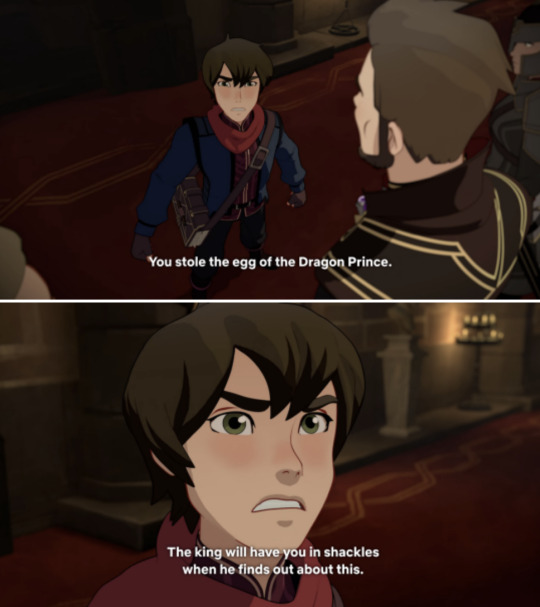
It's not just that Viren lied, it's that Viren's lies and choices put Ezran in danger, and that's just not acceptable. We see this happen again with Claudia in S2, even after Callum defending her and trying to give her chances. She lied, yes, but she scares Ezran and attacks Rayla again, and that's the breaking point.
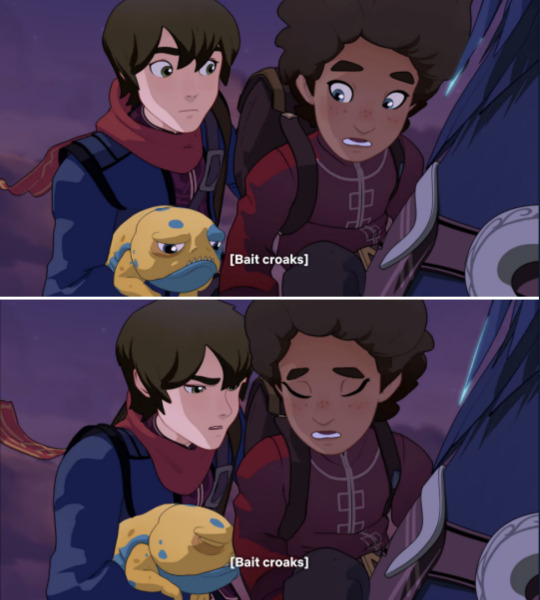
When you threaten the people he loves, when you scare them, if he trusted you, he will never look at you the same way again. Any loyalty he felt towards you will snap and snap hard, permanently, like a wishbone.
Callum loves and cares for other people. He loved and cared for Viren and Claudia. But unlike Ezran, who is willing to give Claudia a chance in 3x09 to the point of running after her, helping hand extended, and unlike Rayla, who still adamantly loves Runaan even after their fight and with no hint of change from him, Callum does not take other people hurting his family lightly, at all.
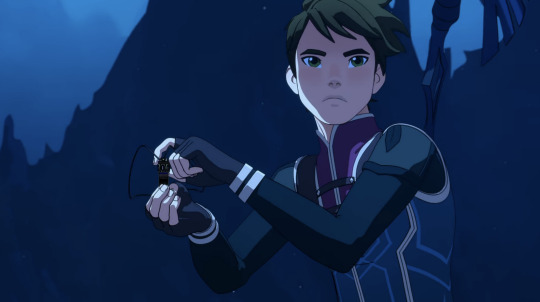
He loves and cares for Amaya, and Soren, and Harrow. But even Harrow, his father, is someone he's willing to put on the backburner — despite having an offered chance from Rayla to save him — in order to do what Harrow asked and what Callum's first instinct is: to look after his brother, because it is fundamentally unsafe for Ezran to stay at the castle for any longer, and he knows it.
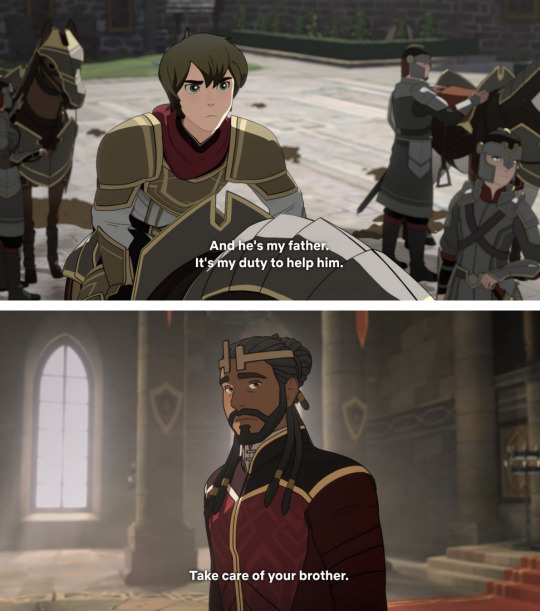
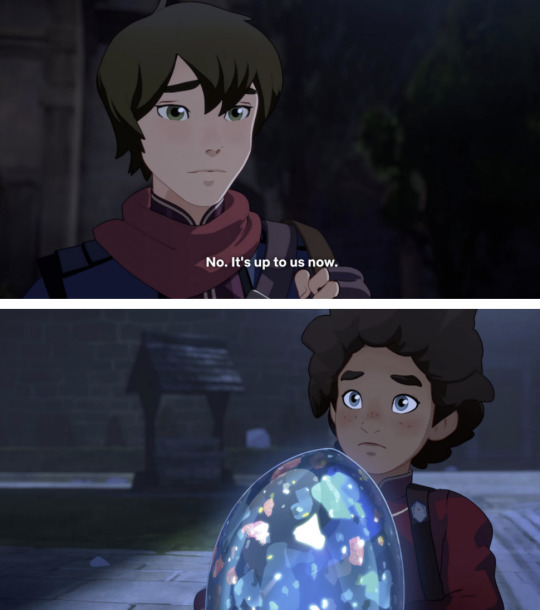
Callum knows what the egg might mean, but he does not follow Rayla out the dungeon door blindly. He runs only after Ezran does, and only after Claudia might hit Ezran with lightning. Then he acts. Then he makes a choice. Because his loyalty to his brother outweighs after other substantial relationship in his life, at this point, but it doesn't necessarily stay that way.
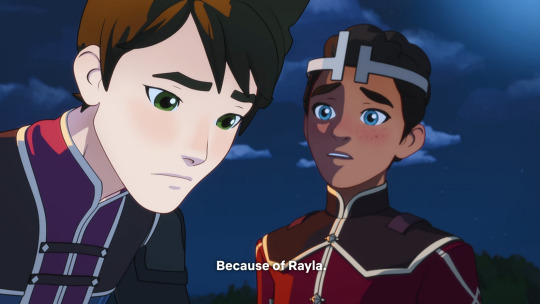
Inner circle
In Tales of Xadia, all the characters are given values. While the values have more generic explanations (i.e. Callum's highest one, Liberty, is labelled as, "Have you ever resisted the control of others? This value is about freedom and autonomy. You’re motivated by a world without oppression or suppression") the characters individual bios help offer more clarity on their specifics. Callum's, specifically, states, "I am beholden to my inner circle, not some silly kingdom." Ouch, from Katolis' crown prince and Ezran's heir apparent.
It is, of course, important to not take this trait entirely literally. If Callum truly valued his own personal autonomy over everything else, he would've taken Finnegrin's deal in 5x08 in a second if all he wanted as his own freedom. Instead, Callum's highest value being Liberty is far more about his place with Freedom as a Theme more than something he wholly actively desires; again, we see in 5x08 he's willing to risk more of his freedom by doing dark magic in order to save Rayla.
There are things that Callum values more than his own personal freedom and there are things that he values more than magic (2x04: "Callum, you're being an idiot! Why would you do that? You can't risk your life to learn magic") vs throwing himself off the top of the Storm Spire at the slimmest chance of, once again, saving Rayla.
That said, this value and quote is still very useful, as it does then, beg the question, of who exactly is Callum's inner circle? Well...
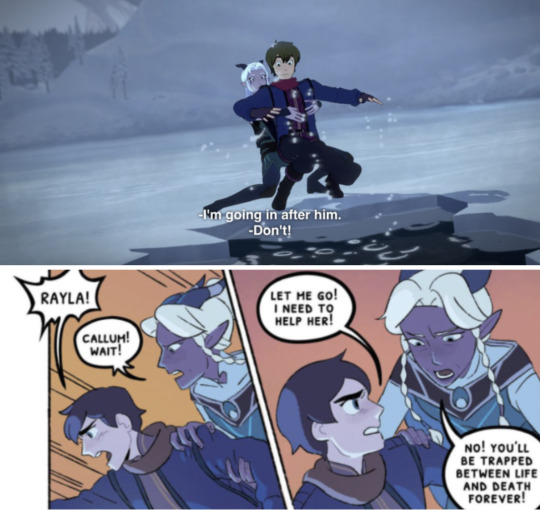
Ezran and Rayla are the most important people in the entire world to him. Full stop. There is nothing he will fundamentally put above them. He only stays behind in 1x06, thereby not sacrificing the egg by proxy, because Rayla points out "We'll need to be up here to pull [Ezran] out." Even when he was stressing about whether they'd gotten to the Sea of the Cast Out on time, the second Rayla showed a hint of major discomfort/potential self-deprecation, he was offering to get back into the goddamn boat to comfort her ("I'm getting out—" "No. I can't do it, but you have to"). He's hesitant to go into town to find a vet for the egg because "We will definitely find some elf hating humans," pouting further when Rayla brushes him off, and flings himself off his balcony when he thinks there's even a chance that Ezran isn't okay into what he knows would subsequently be a trap. He's the first to say that they need to leave Rex Igneous' chambers after protecting Ezran from falling rocks with his own body, and the last to actually leave, almost being crushed by rocks himself because he's so committed to standing there and watching Rayla leave.
He equates Rayla's love for him with his love for Ezran on Day Nine (2x03: "I couldn't tell him. And I understand why you couldn't tell me. When you care about someone, it's hard to hurt them. Even when what you're saying is the truth.")
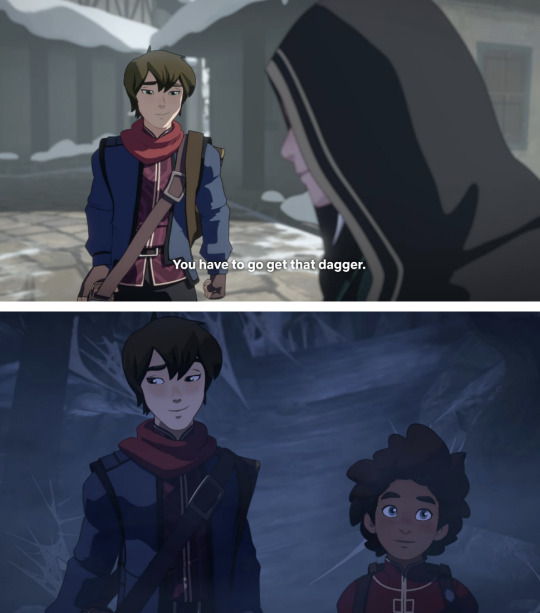
Hell, he even forgets that Sol Regem is there in 3x01 because he tunnel visions on Rayla needing his help so intensely she has to point out the massive ton dragon actively trying to kill them to him.
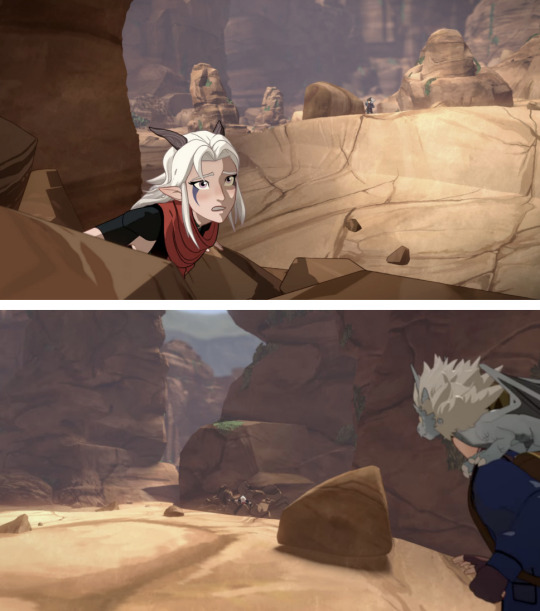
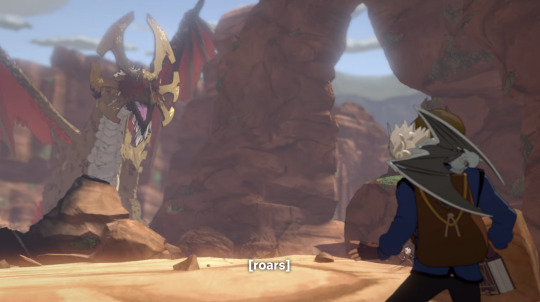
He's a nurturer, a fixer, a solution seeking. He wants to make you feel better ("See it's working right? Don't you feel a little better?"), he is a kind reassuring word ("Don't be so hard on yourself, Ez") always, he thinks of your problems even when you don't (Rayla's binding in 1x07), he will lay his life down for you without question ("I am Prince Ezran"), he will get mad at you for treating yourself poorly (3x04, like almost all of S4), he dotes, he notices, he will compromise his beliefs for you ("Could he really bring himself to go through with his plan? What if he didn’t succeed? What if he compromised his beliefs and it was all for nothing? [...] But Rayla was in trouble"—S2 novelization).
You mean everything to him: "Rayla's strong, thin arms wrapped around him meant everything" (S2 novelization of the hug scene in 2x04) / "You're my brother, and you mean everything to me" (2x06).
You are his whole world.
If you're part of his inner circle, and not everybody is, so let's talk about it.
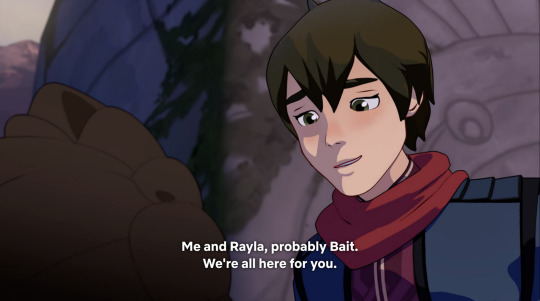
[ Callum, excluding Claudia and Soren from their support system, even though the siblings haven't yet betrayed them, while including Rayla, even though he and she haven't made up yet. ]
What about Soren and Zym?
As stated before, Callum's selective loyalty does not mean he doesn't care about other people in his life, such as Claudia (in the past) and people like Amaya, Soren, and Zym in the present. Merely that, slightly like Claudia, Callum does have an internal hierarchy of care — the way you might have friends vs best friends — of who takes priority, and we see S1, S4, and S5 in particular demonstrate this quite well.
As already stated, Callum prioritizes Ezran over the egg in 1x06 and is held back emotionally by Ezran fuelled logic and physically by Rayla. In 1x07, he doesn't want to risk going into town — even to potentially find help for the egg — because of his last disastrous experience with humans and Rayla. In 2x04, Callum is perfectly happy to walk around a sea to let Rayla avoid her fear of water, and approximately 5 minutes later is getting on Ez and Rayla's case for goofing off (with Rayla's thinly veiled and fallible disguise) because "Sometimes getting someplace slightly faster is important, like right now." Wasn't quite the tune he was singing earlier, now was it? For Zym, we see this again in 3x04 — Rayla is having a breakdown, so she has more of an excuse, but Callum should conceivably be much more clear headed, and he still tunnel visions into leaving Zym alone with Nyx leading to the theft. Likewise in 4x07 when the group thinks Zym might be gone, Ezran is the one who states, "I'm not leaving without him," and Ez and Rayla are both pretty broken up about it; Callum is sad, for sure, but he mostly focuses on taking care of Ezran and placing a hand on his shoulder.
Then you have Amaya, who Callum loves dearly, but isn't particularly torn up over not trusting or lying to (1x04, 5x03) in spite of being close to her, and isn't as vexed even when he thinks that maybe something bad has happened.
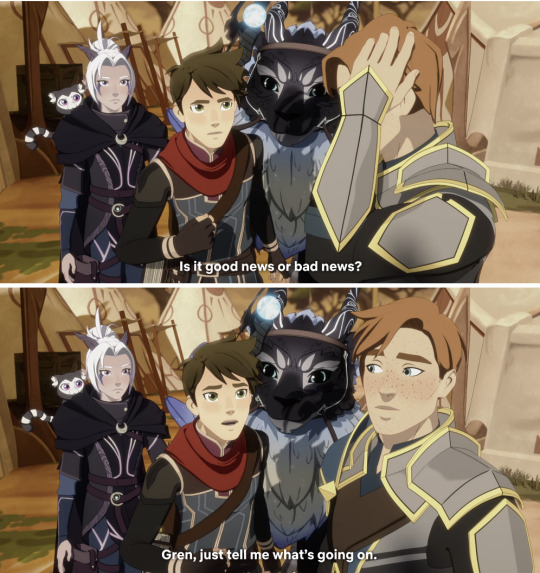
Even when Callum thinks it was bad, and potentially very bad ("The way Gren was talking, I thought maybe the world was ending or something!") he doesn't get angry and he doesn't get demanding. This is very different from how he responds to Ezran and Rayla being potentially in danger or just in trouble.
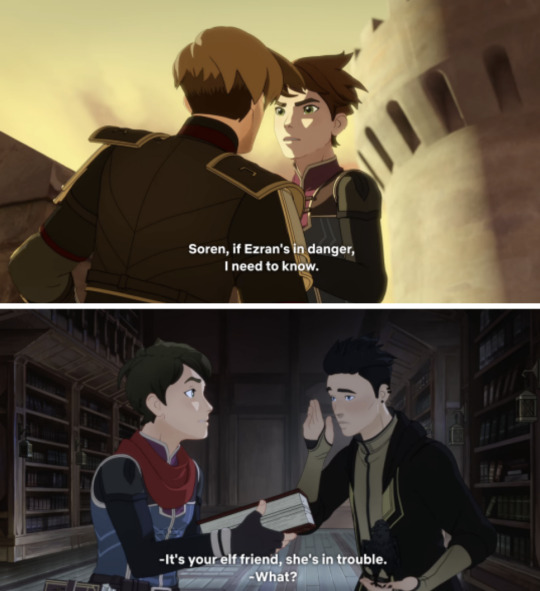
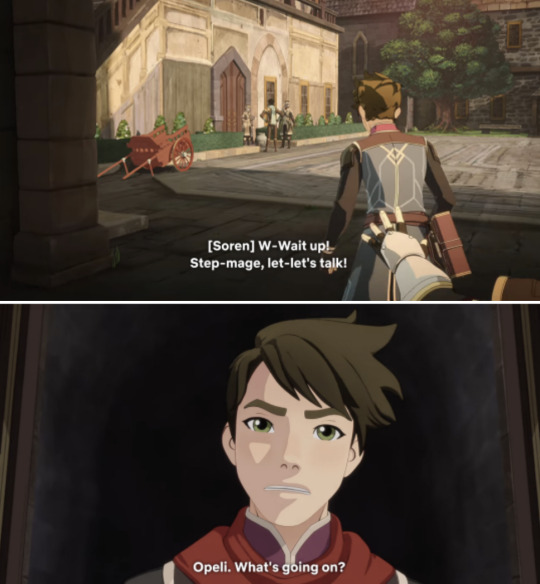
Which on that note also highlights another key importance between how Callum treats Rayla, in particular, versus how he treats Soren. Now, you could argue that Callum in 5x01 has emotionally matured/healed further than he has in 4x01 prior to Rayla's return, and that would be perfectly fine to do. However, it doesn't change the fact that just the hint of Soren keeping a secret — even before Callum thinks, at all, that it's about Ezran — makes him wait on the battlements to coldly and sternly interrogate Soren about it. With Soren, he demands,
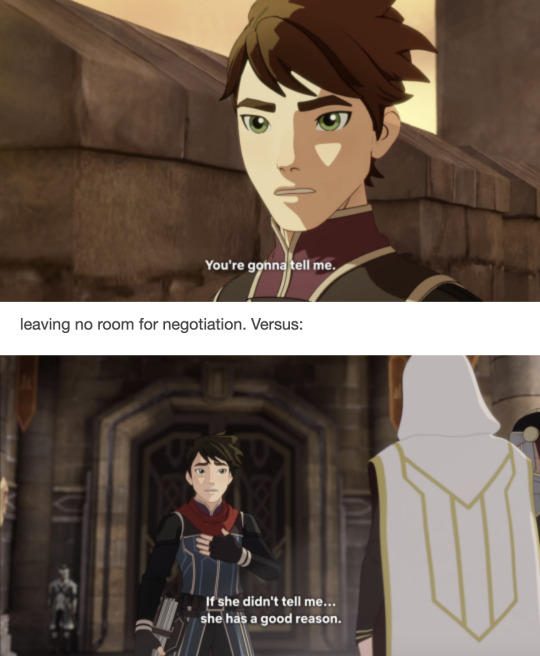
C: I know this — the ties are true as the ocean is deep [...] It means I trust her. Unconditionally. Let her go. Now.
R: About your key and the bow. I can explain.
C: No, I meant what I said. You don't have to explain or justify anything to me.
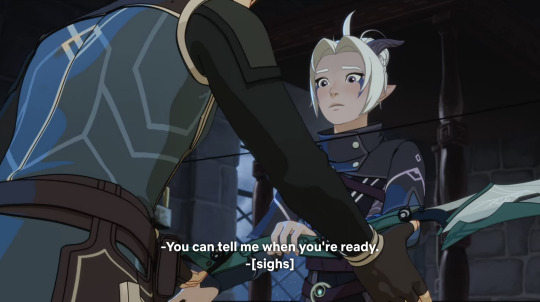
Even when Rayla engages in actually shady behaviour — omitting the truth if not outright lying, stealing his key, and retrieving a painfully poignant weapon — Callum doesn't get mad, at all. Soren just implied he was potentially keeping a secret from Callum at the council meeting and lowkey got his ass handed to him, with Callum literally shoving him out of his way and needing Corvus' help to coral the angry step-mage.
Furthermore, even when Soren goes missing in 4x06, although concerned, Rayla is by far the most broken up about it. Ezran is optimistic because he's, well, Ezran; Rayla is torn because even though she doesn't know Soren that well, she feels like it was 100% her fault he's gone missing and has possibly gotten hurt; and Callum, well... mostly focuses about how she feels about it, and less so about his actual friend (because if Ezran or Rayla are emotionally hurting, they will take priority to him). He's focused on making sure she feels better.
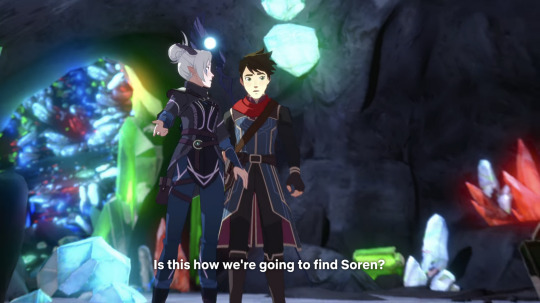
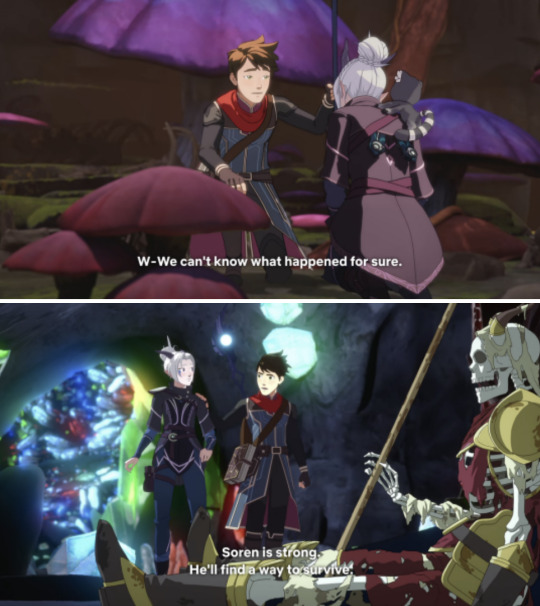
Again: Callum loves Amaya, and Zym, and Soren. He loves them dearly. He wants to and does protect them. He can and will take care of them. But push come to shove, they're not in his inner circle — he doesn't trust them the same way, and he doesn't focus on them the same way, because when it comes to his inner circle, he loves them
More Than Anyone or Anything
So after seeing Callum like this from S1 onwards, you can imagine I was pretty thrilled upon opening up his bio in Tales of Xadia — which seems to be the most 'canon' of the supplementary materials thus far (scenes and ages are changed in the novelizations; timelines get a little wonky in the prequel graphic novels; some designs from "Callum's Spellbook" ended up being different; the art book is full of beautiful concepts, of course, that never understandably got off the ground) except perhaps for Though the Moon — said the quiet part out loud. Not only does TOX have plenty of lore drops and hints at future arcs that are coming to fruition (Aaravos' connections to Elarion, mentioning the Great Bookery of Lux Aurea and Leola, etc) but they did something very interesting when it came to what values which character had. There's some leeway as this is very much an Arc 1 reading (probably most clearly seen in Soren's bio) but there is still plenty of bleed over into Arc 2.
Now, as I said before, we don't want to take the Values too literally. As talked about previously, a lot of the characters highest values seem to be things their arcs are set up to thematically test rather than being a 1:1 what they value the most. But I feel like you can glean a good deal from them, so let's look at the trio:
EZRAN:
Justice — 10: I expect the best of people and try not to become an agent of cruelty.
Devotion — 8: All creatures—regardless of origin—deserve love and appreciation.
Liberty — 8: I value the liberty of everyone, sometimes even more than my own.
RAYLA:
Devotion — 10: Love and devotion compel and define me.
Justice — 8: At great personal cost I will strive for what’s right.
Liberty — 8: My only allegiance is to my heart and those who know it.
CALLUM:
Liberty — 10: I’m beholden to my inner circle, not some silly kingdom.
Devotion — 8: I value those close to me more than anyone or anything.
Mastery — 8: I aspire to know the great wonders of every primal magic.
Out of all the more 'heroic' characters listed in the handbook (Amaya, Janai, Aanya) only Callum and Lujanne do not have Justice, "Have you ever been compelled to fix what’s wrong? This value is about balance, virtue, and reward. You’re motivated by adherence to fairness and what you think is right" among their top 3. Each have it at a 6, instead, which the guide labels as, "This matters, but so do many things" and is the second lowest ranking a value can have. None of the main cast have any value at the highest ranking, 12, either, to help indicate scale perhaps.
Devotion, then, is the one we're currently the most interested in for Callum, since as said before, while the general value descriptions are useful, the specific ones help show more indication. Devotion is referred to in Tales of Xadia as, "Have you ever been obligated to others? This value is about duty, faith, and friendship. You’re motivated by the bonds of loyalty and your love for others."
Although devotion is Rayla's highest value, her devotion value makes no indication of who/what she is Devoted to. Whereas Ezran's reflects his deep love and appreciation towards animals (hence saving the baby glow toads in S5) and Callum's we'll get to in a moment, Rayla's we're not privy to. Instead, we can look at her Liberty value, as it states that her allegiance is to her heart ("My heart for Xadia") and to her loved ones (her friends, her family). Much of her arc is therefore feeling torn between what she thinks/feels her duty is versus what her heart is telling her, indicated by her letting Marcos go in 1x01 and the subsequent fallout.
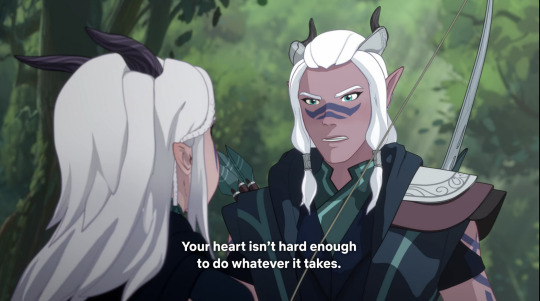
We can also see her state this more clearly in Through the Moon, in which Callum is the one primarily concerned with her parents ("he’s stuck worrying about her parents. About what happened to Runaan. She can’t move on, not without knowing the truth of what happened [...] I hope you find your parents. And Runaan"), versus Rayla going along with the plan, "Callum, listen. Soren was worried about Viren too. Worried that we never found a body. We need to know what happened to Viren. He’s a threat to the whole world! This might be the only way to be sure he’s actually gone! [Upon entering the Portal...] Okay. Viren. My parents. Runaan" and then 5x01 spells it out even more directly.
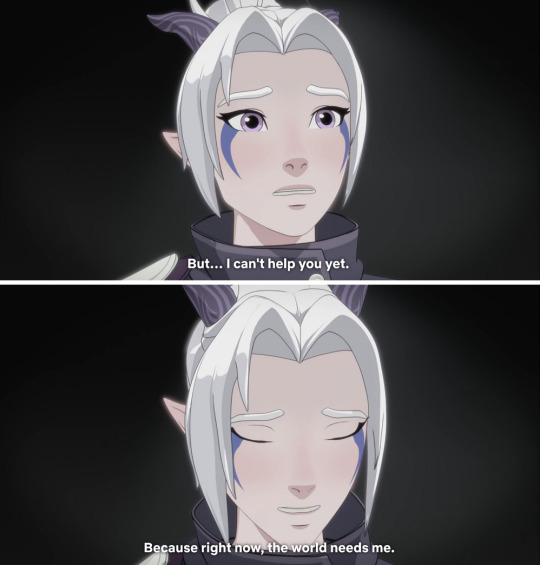
R: Callum and Ezran need me. A great evil is trying to return to Xadia and we have to stop it, at any cost. I think this is what you would want me to do. I love you, and I haven't forgotten about you. I never will. [...] It hurts me to know they're trapped like this. It's agonizing. But our mission comes first. The world is in danger, and you can trust me to stay focused.
Now this makes sense, as Rayla having this push and pull has not only been a defining feature of her arc most seasons, but is ultimately what's going to be the most challenged when the Callum possession plotline rears its head. Does she kill/incapacitate the man she loves in order to protect the world, or does she fight to get him back no matter what, even if that may lead to ruin and chaos? (I'm hoping for the second one, but I will eat either up, lemme tell you.) Does she finally refuse to sacrifice, or does she barrel on hoping she'll only have to sacrifice herself?
The reason I bring Rayla up at all is because I think it provides a good contrast to how Callum operates, specifically in 5x04, in which case he reaffirms his devotion ("I would do anything for you") and then risks everyone's lives by staying late at the Great Bookery, even when Rayla says three times that well, this isn't the time: "Not yet, Callum... Believe me, I want to do something, but... Callum, we need to leave!"
Rayla cares about everyone, and is willing to risk her life for enemies and for strangers. She will abandon her mission for the world in favour of looking after individuals because they need help, regardless of what it asks of her: "Live or die, this dragon goes home." (And because she believes Ezran and Callum can accomplish the mission without her, but that's a post for another day.) As Bloodmoon Huntress makes explicit, as Ethari says:
Who I love, where I love, what I love, are all specific. But to Runaan and those like your parents... love is rooted in all families, all creatures. Souls like that feel called to protect everyone as fiercely as those they hold close. Each time Runaan leaves, it is with the weight of knowing that he may not come back. That to fulfil his duty, he may need to sacrifice everything, himself, and all that we have here.
Rayla likewise feels called to protect everyone, and that's precisely why by the end of Bloodmoon Huntress she's chosen to literally and figuratively follow in Runaan's career path, in order to be able to help protect and save people like Suroh (a stranger she immediately becomes entangled with). As Rayla says to the vision of Runaan and her parents in 5x01, "I think this is what you would want me to do," because they are ultimately all more alike (even in the occupations Rayla holds, such as assassin or dragonguard) than they are dissimilar.
The reason I highlight Rayla here is because 1) it is her highest value, being the only character to have it as said highest value (Claudia's, likewise, is only an 8 — but everything she does is indeed for her father, and unknowingly herself) and 2) I think it provides a clear contrast to Callum.
Because Callum's devotion does outline who, or what, he's loyal to. He isn't loyal just to causes and he isn't loyal just to concepts. While he cares about the world, when his back is up against the wall and it's a choice between that kind of security vs the life of a loved on (Ez, Rayla), Callum will always choose the latter. He cares about the world — to a Point.
I've talked about it before, but merely a statement of "I value those close to me more than anything" would accordingly be a lot more vague. There could be discussions and debates on what the 'anything' constitutes (morals, responsibilities, hurt feelings) with a lot more grey room as to whether it would include people (strangers).
“Maybe there is something I can do,” Callum said. “Ezran, you stay here. Protect Bait and Zym. Don’t worry. I’ll be back soon—with Rayla.” [...] Could he really bring himself to go through with his plan? What if he didn’t succeed? What if he compromised his beliefs and it all ended up being for nothing? […] But Rayla’s blade bounced off with a clang, sparks flying. She reeled back and tried again. Nothing happened. She was in trouble. Callum inched toward Claudia’s [book].
—Book 2: Sky novelization
But the inclusion of "more than anyone" changes that. It does include people. There is no wiggle room about that.
Now, I'm not going to base my whole thing on one (1) statement from a supplementary material. As previously stated, I've seen Callum with that exact same sentiment for years now, well before Tales of Xadia (March 2022) was released, and well before S4 or S5 premiered. I've gone over a lot of the reasons I thought Callum had selective loyalty even in S1, but I haven't touched too much on one of the biggest reasons why I think that selective loyalty includes a devotional component that borders on dangerous (at least, in a story). And that's, well...
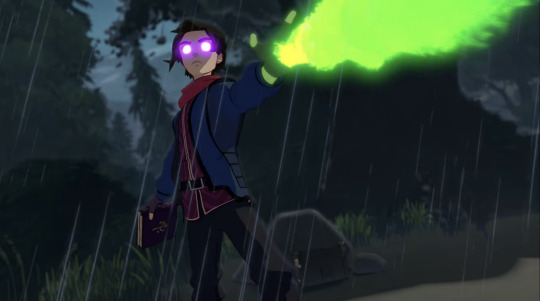
“Rayla told me you used Dark Magic,” [Ethari] said, more stiff and cold.
Callum shrank a bit, but his eyes hardened. “I couldn’t just let her die.”
“You’d do it again."
The prince scowled. “I’m not like Aaravos. He twisted the primal to be like Dark Magic. I would never do that.”
“Unless you felt like you had to,” [Ethari] reiterated. “To save Rayla.”
“Wouldn’t you do anything to save the person you love?”
—chapter 13 of a fic I co-wrote called in search of silver linings (we discovered gold) from july 2019, respectively
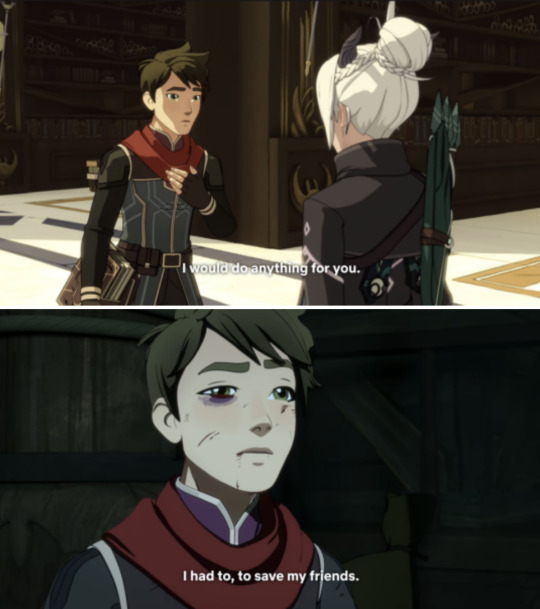
As soon as Callum opened up the door with dark magic in 2x07, I knew it was something he likely would never be able to entirely close. Not for lack of trying or wanting — but that his willingness to engage in dark magic at all spoke to a few different things. The first was the effectiveness — what spell to use, what would be most useful, and what Rayla's biggest problem would be (her swords unable to cut chains) — but most of all was what pushed him there: his devotion.
While magic has always been the thing presenting Callum with paths (to be a mage or not a mage, to be a primal or a dark mage), his bonds with other people, and his love for them — Rayla in particular — has always been what's actually pushed him down certain paths. His love for his mother, and her love for him, is what helps him unlock the sky arcanum. Callum unlocks his wings out of his love for Rayla; he goes down on the path of mage because "you called me a mage, and that felt right."
Although mastery of magic is one of Callum's highest values (an 8, just like his devotion), it was always clear to me that magic is not something Callum values above the people he loves. He can be obsessive, and his love for magic can sometimes put himself and other people unintentionally at risk, but thus far we've always seen him course correct the minute he realizes what's happening. The second things begin to go south at the Banther Lodge, Callum reflects, "We never should've come here," and completely forgoes the quest for the cube. He tries to risk his life just for magic in 2x04, but as we've gone over, he's unable to go through with it, but he will risk his life for his loved ones.
His rejection of dark magic was, to me, of being a dark mage, of not also pursuing primal magic, of relying on dark magic. Not that he would never, under any circumstance, ever do dark magic again if the show put him in the right circumstances. And then he did, in spite of knowing it would make him more vulnerable to Aaravos, in spite of not having any confirmation it wouldn't bring on a second possession, in spite of the fact he was fine being tortured if that meant not doing it or participating.
Then we have Callum giving up the spell, and the fact that the Ocean arcanum is linked more directly to love within his arc — "To love is to simply know this: the tides are true as the ocean is deep" (5x01, 5x08) — in addition to being aware that there are unknown depths in what he's willing to do for said loved ones/Rayla.
This is not to say that none of the main cast would do dark magic — although I don't think Soren or Ezran ever would, and I think Rayla would but only perhaps using herself as spell parts — but that, as the primary mage character, it's going to and is playing a much bigger part in Callum's arc than the others, who are given other thematic considerations.
He hates dark magic. He doesn't want to let Aaravos control him. He refuses to help Finnegrin. He folds on all of those things motivated by love. It's a weakness and a strength; something that, in my eyes, will likely lead to his fall to Aaravos ("Seems to me love's got a tighter grip on you than those chains around your wrists, so I'll do you a favour [by killing Rayla] and set you free") as well as what might save him. But to focus on the fall, with everything already said behind us:
Why Love Instead of Curiosity?
Now, obviously the theory of "Callum will free Aaravos because of [insert non possession reason here]" could be wrong. There's merits in having arcs about the tragedy inherent in losing your agency, it would still open up an interesting arc after the fact, and all that good stuff.
Callum has also very much always been an Icarus figure. He can be obsessive with magic, he can take it too far, and he does have a deep curiosity and thirst for knowledge that has already gotten him in trouble by not excluding dark magic from the bunch.
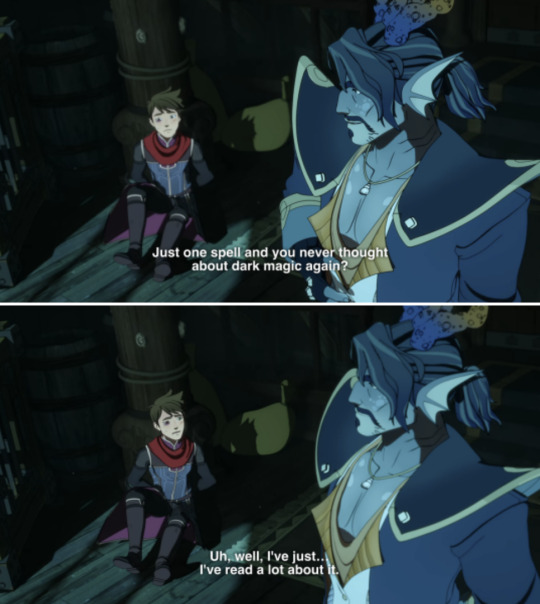
And deep curiosity is already hinted to be what partially causes him to fall further into Aaravos' clutches in a few different places. The mirror ("What secrets are you hiding?") and the cube ("Perhaps it will be you, Callum, who discover's the cube's secrets") seem accordingly linked and fittingly so, for the Mystery of Aaravos, as is magic: "it's the secret of the primal".
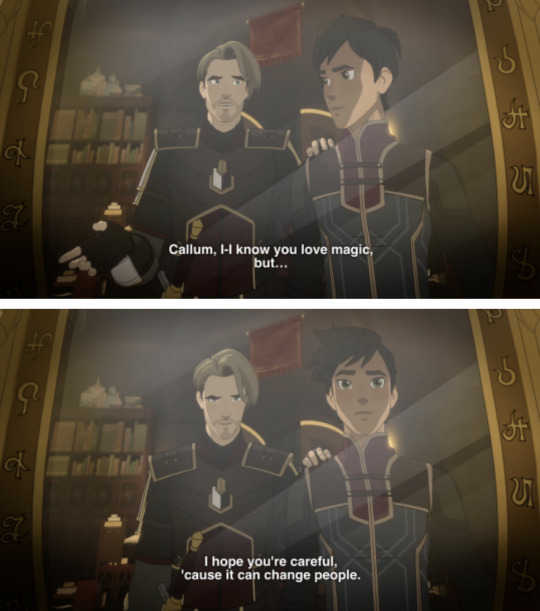
Zubeia also warns regarding curiosity, citing that, "Aaravos was able to give them something they wanted very badly. Aaravos chose as his instruments people who had strong minds and strong hearts… but who had an insatiable thirst and fascination with magic. Aaravos could offer them access to the great mysteries of the universe. Mages were his prey," which implies that this thirst for magic is what got them (primarily) into trouble. This is reflected (pun intended) in both Aaravos' reading of Viren as "You are too curious, hungry for knowledge and power," and while Callum is hungry for knowledge (and not necessarily power), his short story in which he finds the mirror highlights one of these things as well:
Callum’s eyes prickled with dust and tears. He rushed back to the spiral staircase—but as he reached for the figurine that would activate them, he noticed one last door he hadn’t checked. The small chamber beyond it lay dark and silent. A gleam caught his eye.
Callum blinked at his own reflection.
Curious, he stepped through the door—and there it was.
A mirror.
With all that in mind, and I'm sure there's ones I've missed, too, why on Earth am I arguing that while curiosity may play a factor, I think it's going to be love that ultimately causes his initial downfall / playing into Aaravos' hands?
Well...
For starters, I personally find "doing terrible things for love" to be not only a primary theme of arc 2, but much more fundamentally sympathetic than just getting in over your head because you were a dumbass who couldn't read the signs. I know for myself that if Callum fucks around and accidentally gets himself into a place where (under possession at that point or not) he helps free, or just flat out helps, Aaravos knowing everything that he knows, if he does it for love I will defend his choice every step of the way. If it happens just because he wants more power or magical knowledge (hello Viren 2.0 beat for beat) I'm gonna be a lot more critical of him. After all, Claudia has done a lot of awful things but I still have sympathy for her because they were for her family, in their own fractured way, and operating out of a place of deep emotional pain. If she was doing that just because she wanted to be Powerful and Knowledgable, then no, I'm not going to be that sympathetic.
The other half of it, which you might have already guessed, is that curiosity is not a Motivation. It's a manifestation of a character's pyschological makeup. Even for a character like Viren, who very much chased power, ultimately, for the sake of power, we take time to dive into WHY he wanted those things ("To know that I mean something to you, it means everything to me" / "I dream of a bright future for humanity") and his internal justifications, no matter if some of those turned out to be lies.
Characters who are curious are curious because they want to solve puzzles and have a hard time letting things go; or else they are curious because they want to prove themselves by solving things first; or else they are curious because they deeply love and want to understand and protect the world; or else they are curious because they want to know and have access to tools so that they can fix problems; or else... Well, you get the idea.
Even if it is primarily Callum's curiosity and love/thirst for magic that gets him into trouble (and thus far it largely hasn't been, as we see in S2 with his motivation for doing dark magic — yes, there was a part of him that was undeniably curious about what it would be like, but I don't think he would've pushed himself into doing it without the dire straits of "I had to, to save my friends")... That doesn't answer why he's curious.
Either he will pull a full Greek tragedy and be so scared of freeing Aaravos he accidentally walks into it by trying to prevent it directly (and one of the main reasons he's scared of Aaravos is because he's scared he might hurt people he loves through possession) or he needs another motivation, but it can't just be "Callum really wants this [insert magical knowledge here] and it ends badly," because that offers a plot summary, not an emotional character beat. There's no motivation. They'll have to explain why he wants the magical knowledge, why he's chasing it, why this level of curiosity is something he cannot or will not put down even with all the risk factors at play. It has to be grounded in some kind of sympathetic emotion, and love or fear or a desire to be helpful/useful, or all three makes the most sense to me and with all the prior setup.
Conclusion
As a closing note, as well as thank you for reading this far if you have because this got wildly long and out of hand, I want to reiterate that in many ways, to me, Callum's devotion to his loved ones — that he says "I would do anything for you" and mean it — is indeed his saving grace and biggest difference from Viren, who would rather offer up himself or others or have Harrow die than relinquish the egg, because he would never put a weapon into Xadia's hands. Being devotional — valuing the individual — is not always a good or bad thing, nor is prioritizing the 'greater good' always a good or a bad thing. TDP is deeply interested in exploring all the different circumstances of motivation, sacrifice, and choices.
Nor is selective loyalty a bad thing. I'm not wired that way, but some of my closest loved ones are (and of those in the fandom have, overall, greatly aligned with this perceived aspect of Callum). Merely, this meta is meant to examine the claim in Tales of Xadia that "I value those close to me more than anyone or anything," why I was surprised but delighted to see my view of Callum be so directly spelled out, why I had that view and continue to have it, in addition to aspects/pieces of the text that I think support it.
I believe that Callum is loyal to Ezran and Rayla on a fundamental level he does not really extend to anyone else (including many other people who are also his family) and while this is in many ways something that creates the best sides of him — his nurturing, compassionate, thoughtful and protective traits — it is also something that can be exploitable and dangerous, particularly in a narrative where he is set up to be controlled/coerced by the big bad.
And this meta hopefully explained why.
You can take it or leave it.
—Dragons out
#snake boi callum#two pillars#tdp#tdp meta#the dragon prince#analysis series#analysis#tdp callum#callum#multi#tales of xadia#this got so long YES im mad about it#characterization
81 notes
·
View notes
Note
Jing yuan, blade, luocha and dan heng with s/o who has a scaramouche/wanderer inspired little brother and sometimes she asks them to accompany him (so he won't kill anyone lmfao) the s/o and the brother dynamic is like scara and nahida!! I imagine him and blade either getting along nicely or absolutely despising each other
-----♡
A/N: Hello, Anon! Thank you for the cute request! I absolutely love it!<33
Content: Fluff, established relationships, reader has a little brother, mentions/threats of violence, sfw
Reader has no set pronouns!
((Not fully proofread))
-----♡
》Luocha
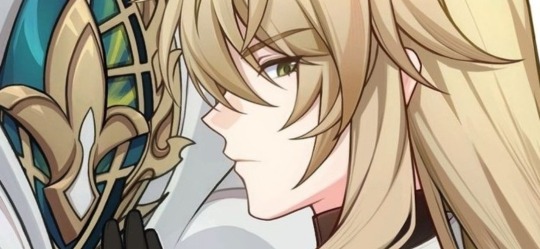
Luocha didn't mind you bringing your brother along at first... until he began becoming a menace to him. He would never outright tell you, that he finds your brother a little annoying and instead just opts to ignoring him, whenever he becomes troubling.
He however also knows how much he means to you and therefore will do his best to try getting along with him. He finds your dynamic kind of adorable, as your brother at least spares you from most of his mean shenanigans.
Luocha will keep your brother out of trouble and will scold him when he gets too out of hand, whether your brother likes it or not. Eventually, he'll begin to maybe respect Luocha, but that's something he'll never admit.
-----♡
》Jing Yuan

Jing Yuan is completely unaffected by your brother's mean words or actions and in fact finds it very entertaining. He'll just give him a lazy grin and tease him with his own words, until your brother gives up and leaves him alone.
Threats of violence or destruction also don't work, as he'll just ask him to duel him then. Once your brother inevitably loses, he'll just take him to play Xiangqi with him to calm him down. Jing Yuan isn't the one to brag and understands that your brother may just be a troubled brat. He'll eventually learn to respect the older man through that too.
Jing Yuan finds your dynamic with your little brother really adorable and will often comment on how much "nicer" he seems around you. And he better be, as Jing Yuan won't hesitate scolding him, if he ever dares insult you too much.
-----♡
》Blade
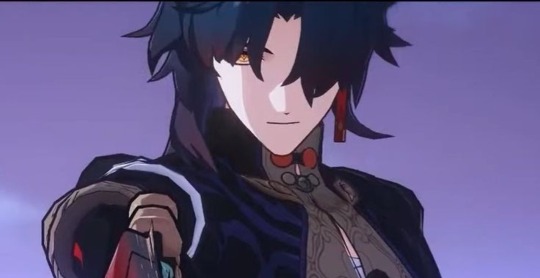
Considering how similar they are, I'd say that they despise eachother because of it. They are both harsh and mean, something they often take out on eachother with poor you in the middle of their arguments. They won't ever see eye to eye and even completely refuse to.
With that said, they also argue over you specifically, mainly if the other was much harsher to you than usual. That ends up with threats of violence of all kind, which you have to nervously shut down before anyone gets really hurt.
But you also try making them get along for your sake at least, by making them spend time together training. This actually does seem to work, as they are impressed by eachothers abilities and begin to mutually respect eachother for their strengths... but that's something they'll never admit to eachother.
-----♡
》Dan Heng
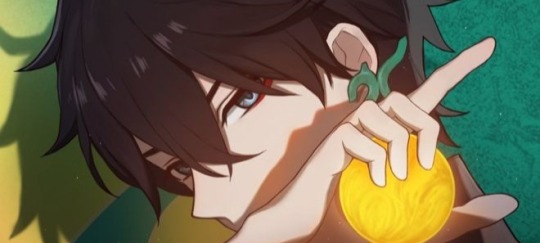
He's just... confused. Like, how are the both of you even related? The first time he met your little brother, he just deadpanned and walked away, deciding he was certainly not going to deal with that. Your little brother will get a similar reaction every time, until he begins to become less mean to him on your request.
After that, Dan Heng will attempt to get along with your brother in some ways, like showing him around the archive room or training with him, whenever he asks. He knows how important he is to you and therefore does his best to deal with him, despite his mean personality.
Though his patience actually pays off, when your brother starts respecting Dan Heng over time and seems to genuinely enjoy his company alot. He never says it outloud ofcourse, but you can tell that he does, whenever he asks you, if you're going to visit him again in an "annoyed" tone of voice.
-----♡
A/N: I hope this was alright! Thank you again for the request!<33
#honkai star rail fanfic#honkai star rail x reader#honkai star rail x you#honkai star rail#hsr x reader#hsr jing yuan#hsr blade#hsr blade x reader#hsr jing yuan x reader#hsr dan heng#hsr dan heng x reader#hsr luocha#hsr luocha x reader
267 notes
·
View notes
Note
What would a gleeriel book even be about??
Ginger is gonna be girlbossing Az around and she (a white woman) is gonna deal with Illyria 😑
her and azriel are gonna be singing and gleeing all around the night court?🤢 (this one’s my favorite)
more training?!!??🥱
And thats it.
Because Ginger has no connection to the troves or anything.
this book sounds Cringy and Dumb. Staring at a wall sounds more interesting than reading this mess.
Gwyn just isn't a main character and I really don't understand how people think she is. Azriel is barely a main character, even.
Their book straight up wouldn't have a plot. As much as I love the idea of Azriel (because let's be honest, mans said like 8 sentences total in the books so we don't know much about him), he isn't tied directly to the overarching plot.
And when I say overarching plot, I mean the next Big Bad Problem in the ACOTAR world: Koschei. ACOSF set up an initial threat/problem/encounter with Koschei that will have to be resolved by the end of the series. Amarantha/Hybern took up the first half, and now Koschei will be the main conflict in the second half of the series.
I don't think anything about Illyria is relevant to the main plot. The Illyrians are not tied to Koschei. Unless they ally themselves with Koschei somehow, I don't see how that plotline would be relevant. Yes they are super culturally behind and treat women unfairly but that's not like ... THE main conflict, especially in a fantasy novel. Besides, Azriel doesn't even care about Illyria so why would that be a relevant plotline for him?
Autumn court power struggle... also isn't really the main plot because it's literally just Beron has to die somehow and Eris will takeover as high lord. What is there to explore? What is the mystery? I guess Beron could also be full allies with Koschei but again, how would that tie in Azriel or Gwyn? It would really only affect Eris. So unless he's getting a book now too... I don't see SJM writing much about the "autumn court power struggle" plotline
Back to Koschei. Literally the only one that could face him right now is one of the Made Archeron sisters. The ones who have incredible powers and can use Made weapons. Nesta already got a book. Therefore the next book... literally has to be Elain's? Why is there any confusion or debate on this? Elain is the last sister. She is also the only one who could actually find information of Koschei and potentially see him. She is Made. She has a mating bond she doesn't want and a love interest who has been forbidden away from her.
THAT is a story. Elain could have a book by herself where she trains her powers and fights Koschei, even without the love interest drama. She does have a love interest (2) which makes it even better, though.
Out of her two love interests, she doesn't want Lucien and she wants Azriel. She has a mating bond with Lucien, but a rejected mates storyline is something SJM has literally talked about wanting to do. What's not clicking folks?
On top of that, Azriel is literally the only one who would know how to train Elain's powers. Apart from Amren who could've helped but now she lacks her "mysterious powers", he is the only one with any powers even remotely similar to hers. He is her love interest, I am sure of it.
Plus, having Elriel get together would also pave the way for Lucien's story. With Vassa. The last remaining puzzle piece on the Koschei conflict.
There are 2-3(?) books left in ACOTAR. 1 conflict left to stretch across both of them as the "finale" so to speak. Elriel is the first missing puzzle piece... Vassien will complete the puzzle.
No other couple will close out the series in a way that makes sense. A book with Gwynriel would just be ACOSF 2.0, and it would not move the plot forward even with both Azriel and Gwyn. Nesta would need to be involved just to tie it back somehow to Koschei/The Cauldron. Then the only book left would be Elucien, in which, woo!another accepted mates but this time by default storyline.
I wish people just saw the big picture here. There's a clear way the books have been written, and all the writing on the walls points to Elriel
18 notes
·
View notes
Text
Inside Out 2: Thoughts and Speculations (long post)
New Emotions: Why Them and Why Now?
While the trailer has only shown 1 of the 4 new emotions, the comments got me thinking about why these specific 4 were the ones added as Riley hits puberty.
Anxiety
I've seen a lot of comments after the first trailer asking about the difference between Fear and Anxiety and based on definitions from the internet, Fear is essentially a response to a perceived threat that is present at the moment, while Anxiety is a response to "What if?" type scenarios that may or may not happen or even be realistic.
When I gave that answer in the comments, many people told me that Fear functioned as both in the original film, and that brings me to the "Why Now" part. I think Anxiety appearing after puberty is meant to represent how, when we're younger, fears that might seem irrational or unrealistic to others (adults especially), feel real to us (if a kid believes monsters exist, the fear of a monster in their closet is very much rational in their mind). But, as we get older, we start to learn the difference between things we should be afraid of (or at the very least more aware of/careful about) and what are unlikely events that our minds simply obsess over, hence the appearance of Anxiety.
As for the other 3, tho we haven't seen them, based on the nature of the emotions, in my opinion it also makes sense why they specifically only appear after puberty hits.
Embarrassment, in my own definition, is the feeling one experiences when they think they've said or done something that makes them look "uncool" or "weird/odd" (this also applies to things others say/do that makes you or themselves seem "uncool" or "weird/odd"). While this can also happen to younger kids, I feel like it's more so teens that have very rigid definitions of what counts as cool or not, as well as being real jerks to anyone not meeting these rigid definitions (kids can be really mean too, but i think they're more flexible about what they consider cool), and therefore Embarrassment is much more likely to occur strongly in teenagers.
Envy, is also an emotion that, in some form, exists in younger kids, however the biggest difference is, I think, in the focus of the emotion. When we're kids and we see someone have something we don't have, but want, our focus is on the thing (which is almost always material), rather than the person ("I want to have X too!). However, as we get older, our focus shifts to the person who has that thing (which can be material or immaterial) we don't have, but want ("Why do they have X?). Notice how, in the first instance, our reaction is a desire to possess that thing (it's less about someone else having it and about us wanting it), and in the second, it is a questioning of why someone else gets to have that (it's more about why they are the ones who have it, than about us wanting that thing). The latter is what Envy is.
Ennui is a form of dissatisfaction with the way things are, that mixes boredom and tiredness. Children often live in a world that is full of fun, adventures and magic, however the world of school gradually loses these qualities and issues can pile up on top of each other. Riley turns 13 in the film, which is around the time (at least in my country) when kids enter high-school, which is progressively less about fun, even compared to earlier forms of school. This is also the period in many teens' lives where they start questioning why they need to do things and things such as existential crises or depression can come in, both of which can lead to things feeling pointless or meaningless, which coupled with burnout from expectations, can result in Ennui.
New and Old Emotion Pairings
Aside from Joy (who is the only positive emotion in the bunch), I think the 4 other old emotions could each pair well with one of the new ones.
Fear and Anxiety
As mentioned above, the two fulfill similar functions, and at Riley's age it's probably really hard to clearly distinguish between them. So I can easily imagine one of them freaking out, which freaks the other out and so on, so forth.
Disgust and Embarrassment
More so as opposites compared to the previous two. As mentioned in the first film, Disgust's role is keeping Riley from being poisoned (both physically, but more important to this point, socially), which includes keeping her from doing things that are seen as "uncool" (like when she wanted to tell Riley's mom that she shouldn't take her to school). And what exactly did I say Embarrassment is? The feeling we get when we have said or done something "uncool". Basically, I can imagine Embarrassment tailing Disgust, preemptively worrying about the outcome of any situation where Reily might say or do such a thing (especially if socialising or romance are going to be topics in the film, which I'd assume they'd at least partially be).
Anger and Envy
If you think about it, this combo makes a lot of sense too. Anger has been shown as the one who seeks justice and fairness. Envy (as per the definition I gave), includes a feeling of unfairness about someone else having something you want to have too and if you dislike that person or simply think you'd deserve that thing more because of y, it can easily lead to feeling "rightful" Anger (at that person, at your parents, at the world or even yourself). So I can see Envy riling Anger up at different things, both material (like a new phone) or immaterial (like popularity).
Sadness and Ennui
Sadness has been depicted as someone who likes to engage in deep thoughts. Due to the nature of Ennui (as I described above), it would make sense to me if they were deeply philosophical, after all, their existence is partially borne of a questioning of one's existence and purpose. So I can just imagine the two of them engaging in deep conversations, even about hard topics like death or the expectations and hardships of adulthood, maybe even gender, sexuality, discrimination and depression.
I don't want to make plot predictions, but I think the positive to negative emotion ratio will play a part, and tho I don't necessarily think Joy will go back to how she was in the first film, I can definitely see her treating the new emotions (Anxiety in particular) similar to how she treated Sadness, at least initially. I also think that Anxiety, who I think will kind of act like the leader of the new emotions, might get antagonised, perhaps even more so than the rest (just like how Sadness was in the first one). I also think that perhaps Joy will kind of get pushed out by the other emotions, as Riley might go through some of the rougher parts of teen life. I also think that after the initial shock, Sadness in particular would be the first to open up to the new emotions (she's been shown to be empathic in the first one with Bing-Bong).
#inside out 2#disney#theory#disney theory#speculation#my thoughts#predictions#disney pixar#pixar inside out
15 notes
·
View notes
Text
I'll be honest about the fact that I didn't like Barbarian—not because it was bad, I just didn't enjoy many of its choices.
But there were aspects I found interesting and obviously have been thinking about, so I can't say it wasn't effective. Mostly I've been thinking about how aspects remind me of Parasite.
Spoilers for both movies below.
Both movies deal with an imbalance of power (class disparity and gender disparity) and show how someone even well meaning and "nice" can abuse that power (the rich Park family is fairly polite and shown sympathetically, and Keith makes some well meaning but inappropriate remarks to Tess).
Both make use of literal different levels in homes to illustrate the descending nature of the characters. In Parasite, the Park family lives at the top in their mansion, the Kim family not quite underground in their half-basement and below them all is the man in the bunker. This is obviously a commentary on their place in society/the economy and how they are viewed in their roles.
In Barbarian the levels represent the men in the film. Keith is mostly fine, just slightly oblivious to how this situation is for Tess. And even once she seems to accept he's not a threat, he still dismisses her legitimate fear after she's seen the basement. She's clearly horrified but he refuses to accept that it's justified and it costs him his life and Tess her freedom.
Keith is the airbnb, the cute little house. Under it is AJ. he's the basement with the horrible room and bed and bucket. AJ is a rapist and therefore a monster in his own right, but in a way that's fairly socially acceptable. He can assault a woman but still feel convinced he's a good person, and rant to his friends about it because people will tolerate rapists like AJ.
The basement, which is terrible enough on its own, leads to the tunnels. The tunnels are Frank, the ultimate monster. A monster so terrible even AJ is disgusted. The monster underneath it all. All these men are represented by the different levels within the house.
The structure of the film in Barbarian mirrors this as well. It's very unusual for a film to introduce major characters so late, and it does this with both AJ and Frank. And I realized it's because it's introducing the men level by level.
At first we meet Keith, in act 1. He's fairly innocuous. The gateway man, if you will. He doesn't make it to act 2.
Act 2 introduces AJ, in his own story. We see him living his own personal nightmare (well deserved) before joining the central story. In act 3 were introduced to Frank. Again, we see his own story for a bit. We watch him shop, watch him stalk that woman. Here the story all ties together, on the final level with Frank. All of this has been his doing.
The final similarity I found is the name. On first viewing you might think the Kim family are the parasites, feeding off the Parks familys money. But maybe it's the other way around, and it's the Park family feeding off their labour. Maybe the Parasite is the guy in the bunker. Maybe not.
With Barbarian there's less debate, as by the end of the film we known for sure Frank is the barbarian (although honestly AJ kind of is too) but at first it may seem to refer to the woman in the tunnels. Certainly she seems monstrous at first, and is extremely violent. But by the end we understand she's just another victim of Frank. The real barbarian isn't a woman made into a monster it's the men who see women as commodities to use.
#horroredit#horror analyst#barbarian#barbarian movie#barbarian 2022#parasite#parasite movie#film edit#spoilers
293 notes
·
View notes
Text
And ykw, in re: queer people eating up terf rhetoric uncritically, I'm STILL reeling about how, when I came back from Twitter, i was seeing all these ads for Folx and Plume on Tumblr, and the ONLY comments and reblogs were attacks, things saying "this company exploits trans people, don't use it."
Plume is a company run BY trans people. It's a bunch of trans doctors who will prescribe you HRT via telehealth and do all your labs, refills, needles etc for like $99/mo (last time i checked). Folx is the same but a bit cheaper and operates in different states, in an attempt to cover gaps in trans Healthcare coverage.
As soon as I started blocking terfs I stopped seeing those comments. But I also stopped seeing anyone talking about Folx or Plume. Point blank. I dont even get the ads for it anymore. It's like everyone just absorbed the idea that they're "preying on trans people" by giving you HRT, which is TERF 101 LEVEL SHIT. None of you even fucking Googled it!!!
Like honestly I'm pretty bitter about this whole thing, and the fact that I've not yet seen ANYONE talk about this or own up to it in the 2-3 years since???? Folx and Plume are both still around. I've had to consider using them multiple times even in relatively "safe" states like Michigan, because sure, your insurance might cover HRT, but good luck finding a doctor who will prescribe it, because PP doesn't do HRT there, there's like 4 doctors in the whole state that will, and they will be like a 6 hour drive from you if they're accepting patients at all.
So like idk especially with all the absolute HORSE SHIT that you guys like to put TPOC, intersex ppl, asexual ppl, and trans men thru at the mere SUGGESTION of terfs, I just have to wonder how many of you are STILL repeating word-for-word terf rhetoric without unpacking it. (I mean, in addition to those of you I SEE STILL DOING THIS.) You may be critically/outwardly against TERFS, but if you don't actually take ANY time to block them, or even recognize and challenge their rhetoric in your head, you arent doing enough to avoid them. Cause you're STILL repeating it and you look foolish, WHICH WAS THE GOAL, BTW. To make queer (esp trans) people look foolish and disorganized, and to drive a wedge between our communities about struggles we actually fucking share.
Another example: I've said it before and I'll say it fucking again, "trans men can't speak to being oppressed bc you are MEN and therefore have Male Privilege, SILENCE, OPPRESSOR," is the SAME ARGUMENT from a few years ago about "ace and aro ppl aren't queer bc you don't experience sexual attraction, you can't be oppressed for something you dont experience, therefore, silence, cishet!" Signed, an asexual gnc transmasc. This was another instance of queerphobic, divisive terf rhetoric getting passed around uncritically for YEARS. (I can't speak to this bc I'm not a lesbian but it does feel eerily similar to "bi lesbians are harmful to our community" as well, that whole, "anything that could even feasibly one day sorta be tied back to Men means its #unsafe" vibe, but also a very, "anyone queerer than a cis political lesbian is a threat to our community," vibe, which feels r/dfemmy to me.)
I see people TALK about the dark ages of asexual hatred on this site, but I dont see a lot of you dissecting how that happened or how to prevent it from happening again to other communities. I see people talking about "wow everyone on this site sure was unhinged about asexual ppl" and then turning around and saying shit like "transandrophobia truthers." fucking look at yourselves.
8 notes
·
View notes
Text
what i find interesting and a moment of a greatly thought through touch, is legolas being a continuation of thranduil in it's pure physical form. and yet, being undoubtedly his own self.
it's an establishment of characters' relationships. in appendices, in an episode about the creation of a character that is thranduil, we can see orlando bloom and lee pace training together in elven movement for this specific reason — bonding and learning of each other's movements. they are father and son, together, but while we know what and who legolas is, the creators present us with an image of the one who was before him. a creature of mightier greatness, the only one who is possible to outshine the son. the father.
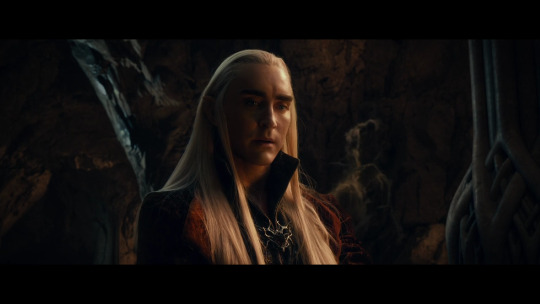
legolas feels different in the hobbit trilogy just because he is different — the environment he is in differs from what we see him in during the lord of the rings. but most importantly, he has a different influence. thranduil is a king, the descendant of a noble house of elves damaged by multitude of tragedies, and that affects who he is as a father who shapes young legolas into some sort of form.

the notion was, that while looking at legolas, we, as the audience, could have imagined how thranduil was long before — to see his genetic, his character, his teaching and his influence in legolas, — but therefore see that he is old. not in a sence that he is crumbling down like an old hag, but a toughened, sharpened, wiser old.
the beauty of that is, that legolas subconsciously, or might be not, follows the way his father moves. or better to say, tries to copy the utter intention — thranduil's movements are of the one who knows his power and what he wants to do with said power. his movements are calculated, reserved. thranduil is always imposing threat — his shoulders are squared, his nose is high but his stare is strictly forward or down upon those who are below him.
thranduil's intention is to defend offensively.

and here's legolas who is a force to be reckoned with and he has a lot of energy to spend. where thranduil is the embodiment of the less is more, because he knows there's no reason to waste energy, especially in a fight. legolas is acrobatic, all in, throwing his whole body into the battle.
legolas mirrors his father in his gracefully snappish movements but doesn't succeed in looking as formidable as thranduil for he is young and impatient. he wants to act and doesn't want to wait.

there's also another thing. while thranduil knows how to be menacing without trying, his life taught him the defense mechanism and he mastered it for the sake of his realm and himself. that doesn't mean that legolas, while still respecting him as king, won't try to defy his threatening power of a father.
legolas follows and resists his father, learns to be his own self through rebellion and a challenge thrown at thranduil. it's not just what we see happening in the script, where legolas defies his father-king's orders, but also in the characterized movements that give it the sense of realism:


he looks up at thranduil and he looks him in the eyes, he is not scared of him and not affected by him. and that is such a thranduil's characteristic in him, which is ironic, his determined defiance while looking like defense of himself and others, is actually an offence strategy.
the difference borne in similarity comes back to the starting point. the movements, while being similar, have completely different intention. thranduil taught his son things but legolas personalized them. that's how you create individuals, the characters that are their own and yet, closely tied to the ones they are related to.
you can believe that they are the father and son not just because they look similar but because they act in a way that give you the feel and the sense. not just words in the script.
#and here i am again#i was watching the hobbit behinds#i am so sorry that i wasn't able to use gifs here#it would have been more efficient#but i have non on me rn so the only examples are from my collection of screenshots#i didn't say anything new but it was fun to formulate#i enjoy analyzing the father and the son#thank you very much#thranduil oropherion#legolas greenleaf#the hobbit#the hobbit the desolation of smaug#the hobbit botfa#character analysis
32 notes
·
View notes
Text
Nitpicking ACOWAR Ch 2 +3
I’m surprised that I got so much responses for my notes on ACOWAR, don’t expect too much out of me though, but thanks. Sometimes I make note of weird things because they’re meant to help me improve with my own writing. This one is long because I had more grievances with Chapters 2 and 3, it’s not going to be the last time either.
Chapter 2
-All of this is pointless. It’s just emotionally charged and nitpicky on the Spring Court, which doesn’t make sense because I never got to see much of it. What is there to even complain about? It’s all centered on what Feyre went through and she’s blaming all of Spring for it.
-Feyre is throwing everyone else under the bus inside her head. It’s boring.
-I don’t understand the point of Jurian. Is he still human? Didn’t the Cauldron bring him back so wouldn’t that make him Fae now? I don’t know why he works for Hybern, he hates Fae.
-Apparently we're still pretending that Rhys didn’t abuse Feyre in the 1st book. I don’t know why Feyre forgives him for this? It feels like the “soulmate” thing is used as an excuse on why Feyre forgave him. A weak explanation.
-Feyre complains about Tamlin selling out to Hybern to save her which apparently makes him unforgivable. If Rhys had done this Feyre would have forgiven him so this doesn’t add up.
-I don’t understand how the mind powers work. Feyre is using her soulmate bond to tell Rhys stuff instead of the mind powers?
-Feyre seems to think that Spring was trying to turn her into a delicate flower. Lucien doesn’t believe this but Tamlin does? In Feyre’s head she believes that Tamlin was only interested in having sex with her and having babies? She thought this in the 2nd book too and it still doesn’t make sense. I remember that Ianthe was the one that was trying to turn Feyre into a delicate flower, Tamlin had other things to deal with.
-For some reason Jurian thinks the niece and nephew of the King are curious about Feyre when they’re snarling at her?
-Maybe Feyre thinks everyone wants to fuck her so that she gets a high out of it? I guess it makes her feel powerful and in control? The problem is no one else’s actions line-up with this so it feels like Feyre is inventing her own truth.
-Jurian and the weird twins are going to the magic wall. Feyre thinks about her sisters but remembers that they’re not human anymore so now she doesn’t care about the rest of the humans anymore. At least that’s what it comes across as. She only thinks about her family.
-I don’t know why the weird twins are the niece and nephew of the King’s and not his kids instead. Is it because in the 2nd book he’s described as ugly and therefore can’t have kids?
-Tamlin is too accommodating in letting them go to the magic wall and Feyre believes he doesn’t care about humans anymore even though she only thinks about her family so I don’t know why she cares. It feels like Tamlin has a plan about Hybern? Lucien is going along with it too. Nothing adds up.
-Feyre keeps thinking to herself that Tamlin is evil now.
-Is Tamlin and Lucien planning things without Feyre’s knowledge?
-Tamlin probably doesn’t know that Feyre defended Velaris and doesn’t know how much magic she has. He’s still protective of her, it almost seems like he still thinks she’s human instead of a Fae.
-Feyre complains that no one wanted to talk about what Amarantha did to them Under the Mountain even though they had to deal with her for 50 years, even longer than she did. Not everyone heals the same way, Feyre probably thinks everyone should handle everything the same as her too. She never communicated this to anyone, not everyone’s a mind reader Feyre.
-Jurian baits everyone for some reason. He knows what a mate is I guess?
-We keep circling back to soulmates in conversations.
-Weird word choices again. What does “unnerving softness” mean? Isn’t soft similar to delicate? Why is it written like it means a threat? Jurian is purring at Feyre, I don’t get it. It’s also written like it’s supposed to be a threatening tone too. I always assume that “purring” is the equivalent of a flirting tone so I’m confused why it’s used this way.
-The weird twins are going after Tamlin and Lucien’s minds, Feyre stops them but they’re not suspicious of her?
-Jurian winks at Feyre for some reason. I don’t know why he does this.
Chapter 3
-Apparently the Hybern commanders can scare animals by their mere presence. This includes Jurian for some reason?
-Feyre uses “we” about not falling for Jurian’s bait anymore. Does this include Tamlin and Lucien?
-Feyre knows how to use Day powers now, I thought she had to train to use those? She only worked on Autumn, Winter, Summer, and Night in the 2nd book. I think she had the healing one too, was it Dawn?
-Tamlin has a headache, Feyre thinks it’s an excuse because she’s leaving for the magic wall that day. Lucien promises him he’ll keep Feyre safe, it’s a nice moment that I wish was expanded on more.
-Fae are still using horses even though they can winnow?
-Feyre calls the magic wall a hideous presence, a weird word choice. Is the magic wall a bad thing? SJM always uses “ugly” to say something is bad a lot in other books.
-Horses hate the magic wall.
-Apparently Feyre did reveal to the weird twins about her mind powers. She still decided to wear delicate clothes for some reason. She chose to wear an embroidered sapphire jacket and brown pants for that reason too.
-Feyre’s instinct tells her that the magic wall has a “wrongness” to it. For some reason the magic wall has formed holes in it. Feyre brings up that she went through a specific hole in the magic wall, I thought in the 1st book she doesn’t remember this?
-Lucien gives up information about the holes to the weird twins.
-Feyre thinks about manipulating everyone during this scene. Feyre wants the weird twins to think she’s afraid of them even though she used her mind powers on them already. Who is she trying to fool here, the readers?
-I don’t know who they mean by the queens. The human queens? Apparently they have a weak grasp on their people? Do they mean that the human queens don’t know that there are holes in the magic wall? Also the human queens are from the continent, I don’t remember if the 2nd book stated this, so the bottom half of Prythian where the humans are doesn't have a ruler but is just a territory. It was only brought up once before I think.
-There’s 3 holes in the magic wall and are all 2 days apart, how convenient.
-Apparently the Fae remembered about winnowing but not all of them can do it. Is it a skill to learn or something? I assumed that it was just exclusive to Fae and they all do it but I guess not. The 2nd book didn’t explain it well.
-Brannagh doesn’t know how to winnow but Dagdan does.
-There’s apparently dogwoods with pink flowers, I’ve only seen white ones but I didn’t know they came in pink. This isn’t a nitpick, I just don’t know much about dogwoods. They do kind of form as pink, then become yellow, and then white, at least to me.
-Lucien knows Feyre is planning something. Do Spring and Night have 2 different plans?
-Beron was a part of the human-Fae alliance for some reason. Lucien says he would’ve always chosen the human side. Is this a dig at Tamlin because he didn’t go against his dad during the war? Tamlin was just trying to get away from his abusive family, but apparently if you’re in an abusive family that means you’re abusive too. Except that Rhys and Lucien are the exception because they’re tied to Feyre and Tamlin is now considered the enemy.
-Lucien is suspicious of Feyre and knows she’s lying about Rhys. For some reason he’s hiding it from Tamlin. Tamlin doesn’t know that Feyre’s wedding ring got destroyed.
-Feyre tries to get Lucien off her scent with lies and thinks Lucien believes her.
-Lucien admits something being a trap, I think it’s about what happened in Hybern at the end of the 2nd book. Feyre hides her anger from him.
-Lucien knows that Jurian was baiting him but went along with it anyway? Feyre asks him about Hybern but Lucien wasn’t able to answer.
-Jurian jeers at Lucien about messing with a High Lord’s belongings, Lucien snarls at him. For some reason Lucien almost smiles after this. Is it to show that he knows what Jurian is trying to do?
-Feyre notices how physically close she got to Lucien. I hate where this is going.
-Feyre thinks about painting Ianthe. It’s implied that Feyre can paint realism, which doesn’t make sense. Isn’t she self-taught? She would not have the painting experience for that, it requires years to get to that level. I don’t think even a self-taught prodigy could get there in around a year. I don’t think SJM knows how art works.
-Because the weird twins don’t care about Ianthe’s beauty it makes them evil? Are we implying asexuality is evil Feyre? She also thinks they’re in an incestuous relationship.
-Jurian doesn’t like Ianthe either but Feyre doesn’t have any complaints about him.
-They left the magic wall but we’re back at breakfast again? Why is everything out of order here?
-Feyre complains about horse riding again even though she didn’t do that when they were at the magic wall?
-Feyre being a “spy” is just a game to her. Which is it? Is she an actual spy here or playing a game?
-Ianthe is jealous of Feyre being close to Lucien even though everyone knows their friends? It has a weird sexual vibe to it.
-Ianthe has decided to party-plan with Feyre. I don’t get it.
-Now Ianthe isn’t jealous of Feyre because she already got what she wanted from Lucien but why was she watching them then?
-The timeline is confusing. Tamlin didn’t want to do the Rite on Calanmai so Lucien took his place, and I guess Feyre and Rhys were having sex on the same night but in the Night Court? Rhys never mentions Calanmai during that in the 2nd book. Feyre sent a letter to break up with Tamlin before this? I thought it was after Calanmai when she did this?
-Lucien says he did Calanmai on his own free will and did it with Ianthe. Feyre wonders if a line got blurred with those 2 during the Rite, I don’t know how that works, I thought the magic that possesses someone during Calanmai was really aggressive? So how would that be the case?
-”You are a better friend to me, Feyre,” he says quietly, “than I ever was to you.” Feyre then proceeds to use him to take down Spring without him knowing. Better friend my ass.
-I genuinely thought Feyre admitted to what Rhys did to her Under the Mountain but she’s actually thinking about her lies instead. Disappointed.
-How much time has passed? Feyre just realizes that Alis noticed that she’s not thin anymore even though she’s been dressing her for awhile?
-Apparently Feyre had Night Court clothes in Spring from those times in the 2nd book when she was taken back and forth. I don’t remember this detail.
-Alis sees through Feyre’s lies. She has seen Mor take Feyre away. Alis says that Feyre came back “right” because of Night. Alis’ cousin worked at the Summer palace, she was also originally from Summer too.
-Apparently in Summer servants aren’t meant to be seen or heard. But I thought that Tarquin was getting rid of that there?
-Alis’ cousin says she saw Feyre in Summer being happy even though Feyre was playing as a “pet” to Rhys there? This was way before Rhys told Feyre about the soulmate thing, so they weren’t even a thing.
-Alis has no loyalty to Spring even though Tamlin let her stay there? She’s apparently fine with Feyre having revenge against Spring even though it will lead to people dying. This is a weak explanation. In the 1st book she talked up Tamlin to get Feyre to choose him but has apparently changed her mind about Tamlin now? She was in the 2nd book and I remember her being fine with how Tamlin was treating Feyre?
27 notes
·
View notes
Text
PatPran & Sacrifice
This post is borne out of my genuine confusion about what people mean when they say pat's sacrifice (to stay in the closet to be with pran) is so great that pran will never be able to repay it.
First of all the universe of the show doesn't even have homophobia so the closet in this context is something that is uniquely made just for them and them alone and is not something that a person unfamiliar to their family dynamics will understand.
So then even if we do consider this closet that both pat and pran are in, why do we say that pat is in it for pran and has therefore made a huge sacrifice when pran literally has done the same thing for him?
Even if we assume that pat no longer gives ming the power to dictate things in his life and thus can see and be with pran as he pleases, and even if it's cos of dissaya's opposition to any association between their families that has forced them into this fake break up drama, it is still a decision that both of them took based on what they wanted alone.
Pat wants to be with Pran, whether he gets to be public with their love or not. Ideally would he prefer shouting it from the rooftops? Yes. But he also doesn't think its worth it if it means losing pran, like he showed in ep8 when he apologised to pran and told him he wouldn't post stuff on social media anymore if it bothered him so much. So here he was willing to give up doing that, to do what he actually wanted to do- be with pran.
Pran similarly offers to give up his need for privacy and living a lowkey non social media flaunt-ey life (free of threat of getting transferred and uprooted again) cos he wants to be with Pat more than he wants all of that. And in this context it is Pran who ultimately gives it up by allowing Pat to post pictures which he immediately does too.
And look at completely smitten babies smiling after having offered to give up something for the other, communicating through the shitstorm that is carrying all that intergenerational trauma.
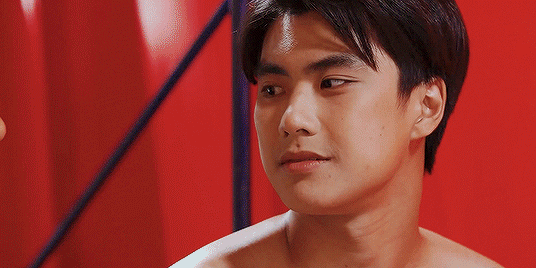
That's love and that's love by choice.
Now flashforward to the fake break up and the continued pretense of being exes while being lovers. Pat has given up the chance to flaunt his relationship (like the heart on sleeve guy he is) to be with Pran. But the crucial thing here is he wants to be with Pran more than wanting to flaunt the relationship. He isn't giving up any alternate happy future with somebody else where he could be open about who he loves, because the one he loves is Pran and if he gives up Pran it is he himself who would be the most miserable. He loves Pran and he wants to spend his life with him and so there isn't any alternate in front of him for him to give up to be with him. This is his one and only option, the only choice he wants to make and he is evidently more than happy with that decision as we see at the end of episode 12 even if ofc he does miss pran terribly cos he's in singapore.
Coming to Pran, i dont understand if im reading it wrong, or if i haven't read the right posts yet but a lot of what i read feels like he doesn't sacrifice anything. {It is a whole different thing that Pat keeps offering help to Pran and Pran accepts it, but we also see Pran do a lot for Pat without being asked, and its just their way of expressing love being different. And them recognising that. This isnt about that}. What im so confused about is the way it feels like there is general acceptance of an imbalance (that Pat gave up so much more than what Pran did) in the ultimate sacrifice that is the fake breakup because if Pat sacrificed something then didn't Pran sacrifice something exactly similar too?
If Pat's sacrifice is giving up the chance to be in a relationship where he doesn't have to hide, then why are we ignoring Pran giving up the same? Or am i missing something? It's not like Pat is the only who can pursue alternate relationships. Pran could too. Dissaya would be very supportive of any other relationship he chooses to be in. And he could probably find somebody who is more similar to him who doesn't mind not flaunting the relationship and having it be lowkey and stuff. These are all possibilities that are open to him too, and yet, it doesn't even occur to Pran ( like it doesnt to Pat) because Pran loves Pat and wants to be with Pat and while ofc it is terrible to have to hide your love and a part of yourself, and while ofc it would be great if they didnt have to hide, if thats what takes to be with each other he would do that, they would do that .
Look at them yelling and teasing each other in full audio range of both their families, smiling from ear to ear having the time of their lives. The closet be damned.
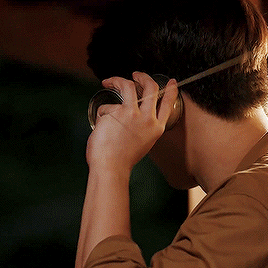
That's 2 men who have gone through shit side by side and continue to choose to love each other daily. No matter how obvious (to eo) that choice might be. Let's never forget that it was intentional.
So to conclude, the fake breakup pretense was a mutual choice, based on their own self interests and any sacrifice was made for their own sake, and it was equally done from both ends. And if anybody disagrees with me, Pran has something to say to you.
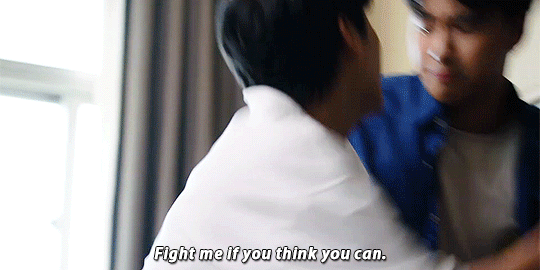
#not but fr i genuinely am curious where this came from#no pran slander while im around#bad buddy#pran x pat#patpran#pran parakul#pat napat#closet be damned
28 notes
·
View notes
Note
Larissa and Wednesday headcannons? Strictly platonic/any other relationship than ship because ew
Note: I know my post says no Larissa x Wednesday content, but that's for the ship. I'm not doing ship content for them. This ask isn't about the ship and therefore is okay.
Larissa Weems and Wednesday Headcanons/ Rambles
Larissa doesn't like Wednesday at first, at all. In fact to her Wednesday is nothing more than a reminder of what she lost and a threat to what she has left in the beginning.
Regardless of whether or not she likes Wednesday she does feel some sort of protective parental instinct over Wednesday, similar to how she feels about all of the students except maybe a little bit more.
She wants the best for Wednesday and is constantly frustrated that Wednesday just. makes things worse most of the time. intentionally or unintentionally.
There is some mutual respect there between them as Larissa respects Wednesday's determination and Wednesday (seemingly) respects Weems' determination as well.
What Wednesday does not respect is Weems ignoring the past to try to pave a better future, and also her manipulation of circumstances and events in order to keep some semblance of peace.
In a more peaceful setting I can see Weems making an effort to take Wednesday to Uriah's Heap because that's literally where Wednesday would've gone for her Outreach Day assignment if she hadn't traded assignments with Enid so they both got what they wanted. Larissa was attempting to give Wednesday something she might find some joy in.
Larissa wouldn't condone any gravedigging though. She just wouldn't.
Wednesday would slowly come to appreciate Weems in a similar way to how she came to appreciate Enid, although it'd still be slightly different, less of a peer-to-peer bond and more of a weird adult and even weirder child bond.
Neither likes or understands the others sense of style/ personal aesthetic.
Larissa loves listening to Wednesday play her cello.
Larissa would also 100% try to listen to Wednesday to find out what she already knows, and offer her things based off of that.
Wednesday would find the constant offering annoying, which in turn would slowly set up boundaries between them.
Mutual and unspoken distrust of Marilyn Thornhill even though Larissa hired her. (Imo it just seems like Weems did it as a way to foster more peaceful outcast/normie relations and nothing else)
On better terms they'd probably play hide and seek from time to time.
Also on better terms Weems probably would've been allowed in on Wednesday's investigation and less people probably would've died/ been hurt. I mean, Weems knew the monster was a Hyde so...
Larissa does not like Thing at first, and like most takes time to get used to him.
If I think of anything else I'll make a part two, but atm this is all I can think of.
Thanks for the ask anon!
#wednesday#wednesday addams#larissa weems#principal weems#wednesday headcanons#larissa weems headcanons#larissa weems and wednesday addams#ask and you shall be answered
54 notes
·
View notes
Text
There’s 3 types of stopping an Akuma and here’s how:
How I see it there are 3 types of stopping an Akuma. Maybe 4 if you want to be very exact to the tiniest detail but I categorized 2 of them in 1 category because I think they are close enough. This does not include defeating the Akuma and cleansing it with the Ladybug Miraculous.
People oftentimes argue that Chloé has been the very first character to resist an Akuma when others bring up Alya as the first to reject an Akuma but that’s the thing. She was the first to resist an Akuma’s influence but she wasn’t the first to reject an Akuma and she was not the first to repel an Akuma. People tend to treat all of these the same but I think they are different cases and categories.
Now this may be a bit confusing without knowing what I mean by the categories repulsion, resistance and rejection so here are my explanations as to what these categories are supposed to mean and include. (If anyone has better fitting names for the categories I am open for suggestions. Those were the best fitting ones I could come up with but they may not match like I wanted to).
1. Repulsion:
What do I mean by repulsion? Well usually this includes instances where an Akuma does not touch an object and therefore gets repelled.
Examples for this are: Su-Han’s mantra in the season 4 episode Furious Fu. Or that time in the season 3 episode Chameleon where Marinette calmed down before the Akuma could touch her belongings. But I also include instances like in the season 5 episode Revolution where Mister Damocles almost gets akumatized but because of his students encouragment he gets courage again which results in the magical charm manifesting as a shield allowing him to cleanse the Akuma before it could touch anything. But then there is the instance in the season 5 episode Collusion where Miss Bustier manages to cleanse an Akuma through meditation (at least I am assuming that was some form of meditation technique). Yes an object of hers got touched by the Akuma so technically it’s a bit different compared to the other instances but it’s also kinda similar to Damocles case since the Akuma got cleansed so I’d still count it as repelling.
So generally we can summarize this category with characters and instances where characters have calmed down before an Akuma could touch them or when they have cleansed the Akuma. (Those are actually the 2 sub-categories which I have categorized in one category because to me cleansing an Akuma and stopping the Akuma before getting touched are both ways of repelling an Akuma to me.)
There is a bit of a side effect to this tho. While in some cases the Akumas do get cleansed because of meditation or the magical charms, it can also happen that an Akuma instead gets redirected to the next victim because the Akuma hasn’t been cleansed.
2. Resistance
What do I mean by resitance? Well usually this includes instances where an Akuma does manage to touch an object but the target managed to resist the temptation and offer of power. However the Akuma doesn’t get cleansed.
Examples for this are: Chloé Bourgeois resists getting turned into an Akuma Villain even after the Akuma touching her picture by rejecting the temptation and Hawk Moth’s offer for power in the season 3 episode Miraculer. Or Félix Fathom when he resisted getting turned into an Villain even after the Akuma touched his stuff simply by rejecting Shadow Moth’s offer (and Senti!Gabriel’s threats) in the season 4 episode Gabriel Agreste.
However because the Akumas don’t get cleansed they just target a new victim so someone else gets turned into an Akuma instead.
3. Rejection
What do I mean by rejection? Well usually this includes instances where an Akuma manages to akumatize the target and fall under some semblance of mind control (since Akuma Villains do tend to act in a way the target would never have acted like without the Akumas influence). However the target eventually manages to break free from that control and manages to deakumatize themselves.
Examples for this are: Alya Césaire in the season 4 episode Gang of Secrets, when Alya managed to break free and turn herself back from Lady Wifi into Alya. Nino Lahiffe in the season 4 episode Rocketear, when Nino managed to break free and turn himself back from Rocketear to Nino. Chloé Bourgeois in the season 4 episode Penalteam, when Penalty got sick of her clones and eventually turned herself back into Chloé. Kagami Tsurugi in the season 5 episode Perfection, when an akumatized Kagami sees how much other people actually care about her. She breaks free from the Akumas control in that moment and managed to turn herself back from Ryukomori into Kagami. Lila Rossi/Cerise (or whatever her name is. I’ll call her Lila for simplicity) in the season 5 episode Revelation, when she manages to deakumatize herself from Hoaxer to Lila after she got the information she wanted from Nathalie.
What I’ve also noticed about the instances in this category is that the characters seem to retain their memories from when they have been akumatized which is something that usually never happens after getting deakumatized. Usually characters are disoriented and don’t remember anything but whenever a character manages to deakumatize themselves they seem to know where they are and what happened. Take Lila as an example. She smirked right after deakumatizing herself like she knew exactly what she did. Or Alya, she didn’t look confused at all and could instantly respond to Ladybug’s comments which is something that Akuma Victims usually never do due to the disorientation and confusion. They usually take a moment to collect their thoughts and realize where they are or why they could be there meanwhile Alya didn’t take that time. She only took a little time to catch her breath. Or Kagami who seemed to remember what happened while she was Ryukomori. It’s similar like with Alya where she didn’t seem disoriented at all and she didn’t seemed confused on why Marinette’s classmates where there with a big picture of Kagami. It was like she knew exactly what happened similar as Alya and Lila.
Anyway…
There really are differences between how a character may stop an Akuma from targeting them.
Anytime someone brings up the characters that have rejected an Akuma there is always someone who brings up Chloé Bourgeois. The character who had a picture touched by an Akuma in the season 3 episode Miraculer and then resisted the Akuma’s influence by rejecting Hawk Moth’s offer for power. People keep bringing up Chloé was the first to resist an Akuma. And that is true but the problem is that they throw it into the same category as repulsion and rejection. How I see it’s not the same thing so I don’t think Chloé should be brought up when people talk about characters who have rejected an Akuma. Same thing the other way around. And same thing with characters who have repelled Akumas. Characters like Alya should not be brought up when talking about characters who have resisted an Akuma. At least not if you are trying to say they are the same thing. It would be like trying to compare apples and pears.
Even if we would act like repulsion, resistance, and rejection are all the same thing, Chloé would still not be the first to stop an Akuma from targeting herself. In that case, it would be Marinette who was the first to stop an Akuma from targeting herself since the season 3 episode Chameleon (in Chameleon Marinette managed to stop the Akuma from targeting her by calming down) was canonically before the season 3 episode Miraculer (in Miraculer an Akuma landed on a picture Chloé was holding and Cloé managed to resist the Akuma’s influence by rejecting Hawk Moth’s offer for power). However like I previously said these are not the same thing. Yes generally speaking all 3 are ways to stop an Akuma from targeting a specific person but they are different ways to do that. Some stop the Akuma from targeting only one person, others stop the Akuma from targeting everyone and the rest stop the Akuma from controlling someone (which kind of is also a form of targeting in a sense. Maybe not the traditional way but it is kinda targeting someone if you try to control them). I don’t want to treat them the same because to me they are not the same. If we go as a whole then yes, Marinette would be the first to stop an Akuma without explicitly using the Ladybug Miraculous. Chloé would be second, and Alya would be 3rd. However, if we divide this into sub-categories like I did Marinette is the first to repel, Chloé is the first to resist and Alya is the first to reject. It just makes more sense to me to divide them into separate categories.
#miraculous#miraculous ladybug#mlb#Did I just write an essay about different categories on how to stop an Akuma?#Yes. Yes I did.#miraculous tales of ladybug and chat noir#mlb season 3#mlb season 4#mlb season 5#Akuma#akumatization#Miraculous S3 Ep Chameleon#Miraculous S3 Ep Miraculer#Miraculous S4 Ep Gang Of Secrets#Miraculous S4 Ep Gabriel Agreste#Miraculous S4 Ep Penalteam#Miraculous S5 Ep Perfection#Miraculous S5 Ep Revelation#Miraculous S5 Ep Collusion#mlb magical charms#Marinette Dupain-Cheng#Alya Césaire#Chloé Bourgeois#Félix Fathom#Kagami Tsurugi#Lila Rossi#Denis Damocles#Caline Bustier#ml analysis#mlb s5 spoilers
13 notes
·
View notes
Text
re: korean war
@centrally-unplanned re the current ‘this week, rat-adjacent tumblr relitigates the Korean war’ affair.
for context, I’m responding to this thread. I came in (in the comments) from this branch, but it seems someone else came in with broadly the same argument.
Anyway I don’t think it’s likely we’re going to see eye to eye on this one, but I feel like I owe you a more substantial response not crammed into a tiny comment box. And by more substantial I mean this is a fucking 6500 word essay.
[Please feel free to just completely disregard it. I needed to get this thing out of my head.]
To attempt to summarise the context, this began with an argument about whether a certain political commenter was stupid for having supported the Afghanistan and Iraq wars back in the 2000s. (Everyone agrees that this guy was wrong, I haven’t seen anyone come in to say that either war was good somehow; it was an argument about whether that should have been obvious at the time, and should be held as a black mark against him.)
This ballooned into a whole tangential argument about which, if any, American/NATO military interventions could be considered justified. In the thread I’m responding to, Ash was arguing that this should be analysed on a case-by-case basis rather than a blanket pacifist stance (I would prefer to say an anti-US intervention stance), offering the Korean War and Bosnia as ‘good’ examples where US intervention led to a better outcome, and the Rwandan genocide as an example of where the US should have intervened, but didn’t. The whole argument was proceeding from a very American worldview that I found... disquieting.
Since apparently I don’t know any better after all, I let myself get pulled in on the Korea angle.
I wrote:
surely the ‘leveled by US bombs, killing millions’ dimension, the suffocating trade sanctions, and the existential threat from the largest military in the world have some role in the DPRK being as insular and paranoid as it is? + ROK got huge US aid, was also ruled by military dictatorship for decades. we can’t know what would have happened in Korea without the US, but it’s a stretch to prevent the Korean War as a straightforwardly 'good, successful’ case of intervention
In addition to the reply to a similar comment linked above, Ash wrote:
Actually just posted about this! It plays a role, but - A: thats every country, why is North Korea unique in this regards? B: North Korea got huge USSR subsidies, South Korea is not unique here either; actually aid’s connection with growth is very weak. And I reject categorically the idea that “we cannot know, therefore we cannot say”. You cannot know removing a tumor was necessary to save a cancer patient. We have to reason under uncertainty, always.
In 1950, before the war, NK was a stalinist oppression state and a branch of the USSR’s campaign of imperial expansion that defined the first decade of the post-war. You have to reason from that stance, the default assumption is “NK would continue to be a stalinist wreck” and “the USSR would follow up wins in Korea with more attempts” as Korea was like its 5th attempt at expansion in the past 3 years. I think other cases are real reaches
with regard to the bombing/aid/growth angle, Ash presented this graph:
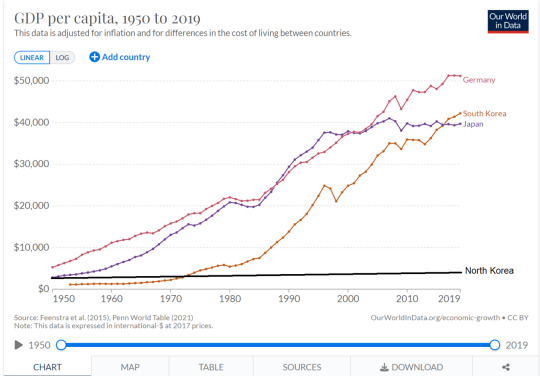
illustrating examples of countries that got heavily bombed and were able to rebuild faster. I’m not sure where the manually-added North Korea data is from (presumably complicated to calculate because the DPRK is so incredibly isolated in terms of trade), but the other data is from something called the Penn World Table, and can be viewed here. Here’s the same chart showing a few more countries that may be relevant (former Japanese colonies, US client states during the Cold War) - unfortunately it does not contain separate data for East and West Germany, which I think would be an interesting comparison:
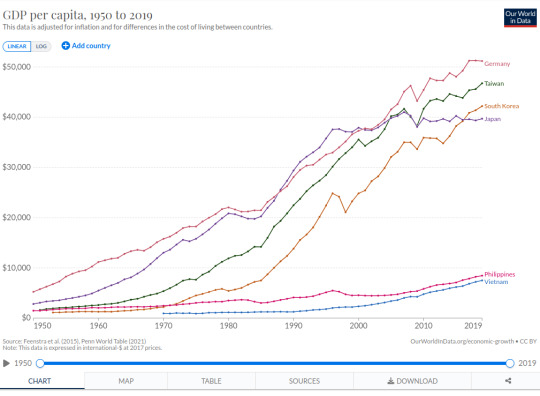
Some notes about this graph: the major divergence between North and SouthKorea begins only in the 70s and gets truly extreme in the 80s-90s onwards; the first couple of decades after the war, the two Koreas are about the same, both ruled by different flavours of military dictatorship backed by different cold war blocs.
In the 1980s, when the South Korean economy has grown about twice as big as the North (following, as I understand, major capital exports from Japan, discussed below), the USSR under Gorbachev suddenly demanded repayment of all the aid it had bestowed on the North - which the North couldn’t possibly afford. Then in 1991, the Soviet Union collapsed; North Korea is a mountainous country with relatively little arable land and was dependent on Soviet aid for food and oil and fertiliser and such, so they fell into famine from 1994-1998 in which their entire economy basically collapsed. Meanwhile South Korea could just keep on growing - more on that in a bit.
Of course, the North Korean government did not respond well to these conditions. They attempted to blame it all on US sabotage, executed a guy, and never really made a serious effort to buy food. I’m not here to say that North Korea was a well-run country.
If I can reconstruct the argument these data are supporting, it would go something like:
North Korea’s economy never managed to evolve out of dependence on aid, while South Korea turned into one of the ‘Tiger’ economies and grew at an insane rate. this ‘number going up’ reflects better living conditions for the people in the country (at the most extreme case, ‘famine’ vs. ‘not famine’)
if the US had not fought the Korean War, a unified Korea would most likely have had a similar historical trajectory to North Korea. thus all of Korea would be very poor, there would likely be Stalin-like mass incarceration and forced labour etc.
therefore, despite all the awful consequences - millions of deaths, all the traumatic effects of war, a country permanently split by a DMZ - the Korean war can be retroactively justified on utilitarian grounds because this counterfactual fate would be even worse.
That’s the retroactive argument. The other facet of this whole thing is an argument that with the knowledge available to US politicians in the 50s, the Korean war was obviously ‘right’. This is a separate question from whether, on balance, it turned out to be a good thing that the US went to war in the long run, but in the chaos of everyone weighing in, it’s not always clear which case is being argued.
So there’s a whole lot of arguments in play here. We can argue about the reasons historical trajectories of Korea and other Asian countries. I am broadly sympathetic to the analysis of the Chuang collective on that front, although it does not directly compare North and South Korea. And I’ll admit, economic history is your area of otakuism, not mine. Still, I want to lay out why I think what I do, even if you don’t necessarily find it persuasive.
Chuang frame their discussion through the ‘flying geese’ development pattern that led to Japan, South Korea, Taiwan, Hong Kong and Singapore developing rapidly, with each economy growing and exporting different types of capital to the next ‘geese’ down the chain. Here’s how they summarise this pattern, before they move to criticise it:
The basic pattern identified in the model is self-evident. Japan began an early, smaller round of direct investment in Taiwan in the late 1950s, mostly in the electronics and machinery manufacturing industries that had boomed during the Korean War procurement program, only to lose their main market once the war was over.[63] The second round of “scrap-and-build industrial restructuring,” now far more substantial in volume, took place between the mid-1960s and the oil shock of 1973. This round was initiated by the signing of the Japan-Korea normalization treaty in 1965, which both opened formal economic relations between the two countries and provided South Korea with a series of Japanese-funded grants and loans (roughly $800 million[64] in total), geared toward infrastructure construction and the creation of the Podang Iron and Steel Company (now POSCO, one of the biggest producers in the world).[65] Lighter, labor-intensive industries were moved from Japan to South Korea, Taiwan, Hong Kong and elsewhere, with the domestic economy shifting to a new base in heavy and chemical industries (again, greatly aided by technology transfers from the US and Europe). A third phase of restructuring followed the oil crisis and the general decline in manufacturing profitability, with heavy industries offshored to the new cores in South Korea and Taiwan and domestic production shifting to a new set of electronic, transport and precision machinery industries producing for export to markets in the US.[66]
The result of this third phase was not only export-oriented production in Japan leading to a trade surplus with the US, then, but also an unprecedented explosion in the size and scale of Japanese-originated direct investment. Faced with massive limits to accumulation at home, Japan increased the rate of its capital exports in an effort to secure more of the shrinking pool of global accumulation. The annual growth rate of Japanese foreign direct investment was 28.1 percent between 1970 and 1982, and by 1984 Japan held a share of 17.8 percent of the total world annual direct investment, even greater than the share of the US. The cumulative total value of its overseas investment between 1951 and 1986 was some $106 billion, with the largest share actually pouring into markets in North America (primarily bonds, securities, real estate, and high tech production), followed by investments in Asia and Latin America.[67] After the signing of the Plaza Accord, this trend was only intensified. Between 1986 and 1989, Japanese FDI grew more than 50 percent annually, with an annual outflow of around $48 billion.[68] Official Development Assistance (such as the grants awarded to S. Korea) also grew in the same period, rising from $1 billion in 1973 to $7.45 billion in 1987, roughly 70 percent of this going to other countries in Asia, a large portion in the form of loans, often originally intended as war reparations.[69]
Chuang argue that this pattern was primarily determined by the geopolitical factors of which countries the US built up in the Cold War, although they prefer to characterise the US itself as merely the ‘hands’ of underlying capitalist logic which they’re attempting to describe. To be clear, in this account, they’re seeking to explain and analyse reasons for what did happen, the logic underlying the machine, rather than argue about whether it was better or worse than some counterfactual.
Here’s what they comment about the development of Korea:
Future developmental drives were therefore defined by their proximity to US political power, now facilitated by Japanese financing. In the same way that Japanese industry had been catapulted into the forefront of global production by the Korean War procurement program, industrial development in Taiwan and Hong Kong would be shaped by the military containment of the Chinese mainland. After the CCP won the civil war, the Guomindang (GMD) government fled to Taiwan, where it established a military dictatorship with US backing. With the Korean War and two crises in the Taiwan Strait over the course of the 1950s, Taiwan was an active front in the early years of the Cold War. The US not only began continuous patrols of the Taiwan Strait, but also poured funds into Taiwan to stabilize Chiang Kai-shek’s dictatorship. This funding was already substantial in the immediate postwar years, but skyrocketed during the Korean War, with military assistance composing a growing portion (see Figure 1).[76]
One paper goose followed another. Hong Kong, much smaller and still a British colony, nonetheless also received $27 million between 1953 and 1961 from USAID.[77] Similar funds for South Korea between 1953 and 1961 amounted to more than $4 billion.[78] Then, in 1963, the rise of Park Chung-hee’s US-friendly dictatorship sparked a burst of industrial build-up not seen since Japanese colonization, itself mimicking Japanese procurement-driven industrialization, but now driven by military demand during the Second Indochina War. Fifty thousand South Korean soldiers were deployed into central Vietnam by 1967,[79] paid some twenty-two times the regular pay they would have received at home.[80] This not only helped to funnel wages back into the Korean economy but also established a basis for wartime procurement contracts on the part of Korean chaebol firms. Some of these contracts were for the simple procurement of goods, but many were also for infrastructural projects in Southeast Asia that supported the greater war effort. Hyundai was contracted to build a series of landing strips as well as the entire Pattani-Narathiwat highway in southern Thailand, for example, receiving both US funding and important training from the US Army Corps of Engineers. All of this allowed the firm to vastly expand the scope of its projects after the war was over, including a series of construction contracts in Guam and Saudi Arabia.[81]
In sum, the offshore procurement contracts for Korean construction firms averaged just over $20 million per year (in 1966 dollars) between 1966 and 1969, peaking again at some $17 million per year (also in 1966 dollars) in 1979-1985, when Korean chaebol secured US-backed contracts in the Middle East.[82] From 1964 to 1969, combined military assistance and offshore procurement composed between 30 and 60 percent of gross capital formation in South Korea, far more than any other country in the region.[83] There was nothing organic about its rise, and the success of its industrialization program cannot be accounted for merely in terms of market demand. This is apparent if we compare the case of South Korea with the conditions of the Philippines in the same period. Both were at roughly equal developmental levels in the 1950s, and both had previously been conquered by the Japanese and yoked into the “Co-Prosperity Sphere.” But they had not been equal players in the Japanese imperial scheme. Preference had been given to the earlier-conquered Korean colony, the lower position of the Philippines justified in the racial pseudo-science of the time. Then, after the war, the lower priority of the Philippines for US interests meant that the country never successfully instituted the wide-ranging land reform seen in Japan, South Korea and Taiwan. This created instability at the core of the newly-ascendant Marcos regime, certainly friendly to the US, but never considered to be as reliable an ally as Park, Chiang Kai-Shek or Kishi. Despite requests on the part of the regime for offshore procurement contracts similar to those received by Japan and South Korea, the Philippines refused to send combat troops for fear of the domestic response. Already wary of the new government’s commitment to US interests and fearful of its ongoing internal revolts stemming from the failure to implement land reform, the Johnson administration dismissed Marcos’ petitions for industrial contracts.[84] The bulk of contracts awarded to Asian countries therefore went to South Korea, with a smaller set awarded to Thailand, which deployed eleven thousand troops over the course of the war.[85]
The sheer bulk of investment, combined with the technical training and field experience awarded to South Korean firms, was therefore an integral part of the country’s rapid ascent. Its peak GDP growth rate (14.5 percent in 1969 and 14.82 percent in 1973) even surpassed Japan’s during the height of its postwar boom.[86] The spike in its rate of profit also exceeded that of Japan, and displayed a clear correlation with wartime development, peaking first in the later 1960s, declining alongside the trend in offshore procurement contracts and then peaking again in the 1970s as the firms’ wartime experience was put to use at home.[87] South Korea’s status as the next “flying goose” in the formation was little more than a shadow play. The “Tiger Economies,” like Japan before them, were little more than puppets elevated on the strings of political patronage and hefty procurement contracts. The formation of East Asia as a distinct economic region therefore had inherent political and economic hierarchies built into its structure from the beginning. But the ultimate shape of the region cannot be understood as merely serving US political interests. Instead, the restructuring of the entire Pacific Rim was simply one of the theatres in the general expansion of the material community of capital.
For comparison, you mention in one post that North Korea also got substantial aid from the USSR, comparable to what South Korea got from the US in the same period:
North Korea from 1953 to 1970 recieved $4.5 billion in aid and subsidies from the the USSR in 1980 dollars for economic development; South Korea recieved $3.5 billion, though it recieved more in direct military aid, it got more overall. Neither country stands above the other as an aid recipient. Nor by the way is there any strong correlation between aid and growth in the economic literature, its not what growth comes from.
To flesh that out, here’s the USAID from Chuang, which shows the amount of money dropped on two of the other countries discussed above:
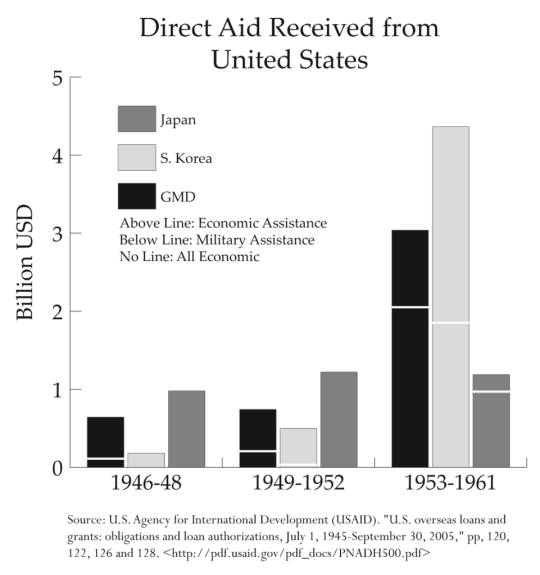
(GMD is guomindang, the government of Taiwan.) I’m not sure where the data on USSR aid in North Korea comes from, but I assume your figures are correct.
So. I agree there definitely needs to be more to the argument than ‘more aid = more growth’. I couldn’t really get into the nuances in the comment box.
According to your own data, the big gap between Koreas only started to manifest in the 70s. Chuang’s story is that the aid of various sorts issued during the Vietnam war, and the associated buildup of infrastructure, essentially laid the groundwork for Korea to receive that heavy Japanese investment in light industry after the war. And if we follow their invitation to look at the line for the Philippines, indeed it never got to enjoy a Korea-style hard takeoff. The Philippines still ended up better off than North Korea, but not by the same orders of magnitude that the closer US allies did.
Chuang kind of skim over why the Philippines weren’t able to implement the land reform they mention, attributing it vaguely to ‘the low priority for US interests’. To flesh that out, in Korea, land reform took place in North Korea in 1946 under the Soviets, and by popular demand South Korea in 1949, shortly after the declaration of the First Republic. This involved breaking up large land holdings and in the North, seizing land held by Japanese or pro-Japanese owners.
Anyway, you say North Korea received a similar amount of aid from the USSR, but evidently they weren’t able to do nearly as much with it. I don’t know the economic history of North Korea well - I understand part of the story is they were constantly orienting an outsized part of their economy to defense, and the Sino-Soviet split also kind of fucked them because the USSR decided to withdraw support when they aligned closer with China. But it also seems like they didn’t have a highly developed economy like Japan to benefit from being the next stair down to absorb capital exported abroad from a retooling economy. There’s probably a bunch of factors in that - the particular geopolitical relations within the Communist bloc, the geography (South Korea is a much more convenient place to land a ship); of course there’s also the fact that, per Juche, North Korea were unwilling to engage much in international trade.
That said, as I understand it, things only got catastrophically bad in North Korea following the famine in the 90s. Here’s a passage from the Wikipedia article, not exactly a tankie source:
An internal CIA study acknowledged various achievements of the North Korean government post-war: compassionate care for war orphans and children in general, a radical improvement in the status of women, free housing, free healthcare, and health statistics particularly in life expectancy and infant mortality that were comparable to even the most advanced nations up until the North Korean famine.[47] Life expectancy in the North was 72 before the famine which was only marginally lower than in the South.[48] The country once boasted a comparatively developed healthcare system; pre-famine North Korea had a network of nearly 45,000 family practitioners with some 800 hospitals and 1,000 clinics.[49]
So if we’re trying to speculate about what would have happened if the US hadn’t fought the Korean War, assuming that the North Koreans kicked out the US-backed government in the South and established some sort of Leninist state - well, there’s so many factors for what might have happened in the ensuing decades that I don’t feel confident speculating. We could sketch out a story, for example, where the ‘hypothetical unified Korea’ benefits from all that Japanese investment in much the same way that South Korea did. Or we could say that would never have happened under Cold War conditions, and perhaps the Philippines would be the rich South Korea-like of this alternate timeline.
However, I take your point that just throwing up our hands and saying ‘it’s unknowable’ is giving up too soon. We can speculate about what’s likely. However, there is no actual way to resolve this - we can only make arguments and analogies, never actually put them to the test.
My actual discomfort is something else, anyway. I feel like in this conversation we’re being invited to take the stance of a US military planner, and try and make a decision about whether to start a war. This is purely a roleplaying game on some level, because I have basically zero influence on whether my country goes to war. I’ve attended anti-war protests, anti arms-fair direct actions, but... the mass protests against Afghanistan under Blair, some of the largest protest movements in this country in my lifetime, did essentially fuck all. (The peace movement might have had a role in America pulling out of Vietnam, but it took a long fucking time and a lot of damage had already been done.)
For these reasons, I tend to view the decision of governments to go to war or not as something that’s rather out of reach. Conversely, if you make it to a government position where you can decide to go to war, there is a powerful selection effect that makes it so you have certain values. So how do we assess these historical men who decided to launch wars?
To be clear, I’m not trying to argue for Team Leninists here. I guess I think trying to assume the US perspective is just as narrow as assuming a perspective that assumes the spread of Leninist states is progress towards (small-c) communism, as opposed to just a particular authoritarian pattern of ‘late development’ that is mostly relevant in the transition out of feudalism and sooner or later gives way to ‘regular’ capitalism. You might view this as equivocation, but I view the two blocs of the Cold War as being more alike than different.
As far as the US, we can take them at their own word with regard to intentions. Chuang quote this charming fellow:
US interests in the region were aimed at preserving this economic and political hegemony, something openly acknowledged by George F. Kennan of the State Department, author of the strategy to contain the spread of socialism. Kennan argued that since the US had “about 50% of the world’s wealth, but only about 6.3% of its population,” the country’s international policy needed to be guided by the imperative to “maintain this position of disparity.”[75]
Evidently, US military planners believed that unleashing bloody proxy wars and military coups across most of the planet was necessary to ‘contain’ the Leninist states; I think they generally believed all the arguments that ‘Communism’ would lead to immiseration of everyone, not entirely without evidence - Stalin really did do some shit. But of course in this regard they would happily prop up their own pet mass-murdering dictators, as in Indonesia, and carry out coups against democratically elected politicians to establish far right military rule, as in Chile. But then, I don’t think we really disagree that US military interventions have historically mostly been disastrous.
(Such historical examples are why I don’t think ‘no blood for oil’, which everyone in that thread is so disparaging towards, is such an overwhelmingly naive way of looking at the reasons why US wages wars, even if it’s not ultimately a great explanation for Afghanistan/Iraq. That’s literally what the coup in Iran was about.)
In any case, in the same way that the US generals believed they were saving the world from the machinations of the communists, the Leninists believed that they had a historical mission to bring about communism and put an end to the tyranny of capitalism. I bring this up because... what frustrates me about the framing of this whole argument is that the US/capitalist actors are seen as reasonable, and their ideology taken at face value, while the USSR/Leninist actors are viewed entirely in terms of ulterior motives such as imperial expansion. I don’t think this is a great way to understand why the US launches war. The powers that be in the US may have thought the Korean war would benefit the people of Korea, but in practical terms they had to look out for their own hegemony. This isn’t really unusual: in every country, the politicians will talk openly about putting their own citizens first.
So, if we’re trying to play a game of ‘Korean War good, Korean War bad’, it requires taking this stance where we take American military planners as the ‘protagonists’ of the story, whose decisions we get to rewrite, and Stalin and the North Koreans as the irrational antagonists.
You said rather glibly that ‘North Korea shouldn’t have started the war’ - and yeah you’re right, in the obvious sense that the Korean war failed to unite Korea and led to 15% of North Koreas dying under American bombs as well as the more general moral sense. But if we’re going to cast back time and roleplay as military planners, we might want to also try to understand why the North Koreans decided to start a war, instead of just saying “oh they were insane and wanted power”.
At the time, both Koreas had ambitions to be the only Korea; that the North went to war first is perhaps a historical contingency, but the South’s policy was also to conquer the North. The ruler of South Korea at the time was a right-wing autocrat known for his ruthless purges of communists and ambitions to reunite Korea by military force, with the help of the US. The US occupation government had recently held elections that excluded the North, after declaring martial law and banning the communists. It is not even difficult to frame this as the US setting up a puppet government.
From the point of view of the North Koreans, then, this act to invade southwards probably seemed like a prudent ‘military intervention’ against a ruthless enemy, one comparable to the Japanese occupiers. Given their conviction that the South was being oppressed by a foreign occupier, they might perform a calculus much like the one above: sure, millions of people would surely die in the war, but Korea would be unified, no longer occupied, and free to pursue the development of socialism through a rational planned economy etc. etc. The PKA would be greeted as liberators, and the Americans would shrug and let it happen like the did the Chinese Civil War, Stalin said so!
An insanely misguided view that led to untold carnage and death? Certainly. Still easy to see how people might believe it in those historical circumstances, at least as much as Americans plotting a futile war in Iraq in a period of jingoism and wounded pride? I think so.
If the war proves anything, it is that it’s very easy to assume that your chances of getting anything out of a war are much higher than they really are. In the end, Stalin’s prediction that the Americans would not get involved was incredibly wrong. But the Americans tried to push North, assuming (I can only guess?) that China wouldn’t get involved... which seems like an echo of the mistake the North Koreans made. Three years later, loads of people died but no sides got what they wanted (a unified Korea aligned with their geopolitical bloc), and had to accept a compromise of a similar state as before the war... minus a few million people and everything that was blown up.
So I feel like it can generally be said that most of the consequences of the Korean War turned out catastrophic. Millions of deaths, a country cut in half by the DMZ, and I would still argue, North Korea becoming a paranoid, insular fortress state cut off from the world instead of a garden-variety janky Leninist developmental regime. Did it dissuade Stalin and Mao from further attempts at expansion? Well, proxy wars continued for decades more, so not completely. Once again we’re confronted with the counterfactual barrier, of whether they would have started more wars, sooner.
But ultimately if we want to ask ‘could the Korean war have been avoided’, the place to start is probably not actually when the North Koreans decided to invade or when the Americans decided to intervene to support the South, but much earlier, at diplomacy and the decisions made by the occupation after the end of WWII. It doesn’t seem like either side really wanted to avoid a war, just have it start on their own terms. But that leads to the bigger question of whether the Cold War itself could have been somehow avoided, and puts us further and further into the realm of alternate history. Ask either side of the Cold War, and it is their enemies that are the irrational aggressors and their own response that is reasonable, if sometimes mistaken, because that’s how the game of war is played in the later 20th century.
Perhaps that’s getting off track, since the original question was about the justification for countries deploying military force now, based on historical examples.
To consider another example, then: you talked about the Cambodian genocide, which as you say ended when the Vietnamese army crushed the Khmer Rouge. It’s hard to see a more justified use of force than this.
However, the Khmer Rouge only seized power through a spillover of Vietnam war. Prince Sihanouk, neutral but Soviet-sympathetic, allowed North Vietnamese soldiers into the country; unrest over this presence resulted in Sihanouk getting couped by the Cambodian right wing who tried to align the country with the US; the North Vietnamese attacked in return, so a bloody civil war erupted, during which the US decided to bomb the shit out of Cambodia on their way out of Vietnam. That civil war transformed the Khmer Rouge from niche ideological nobodies to the major anti-US faction in Cambodia. Once that violence spigot was open, once you’ve got a generation that has grown up as child soldiers in a horrifying civil war where one in five buildings has been bombed, it’s not entirely surprising that something as aberrant as the genocide could be the next act. Moreover, the Khmer Rouge’s rule opened with a refugee crisis in which the cities were full of millions of starving people, so their first challenge was mass population transfer of nearly everybody to the countryside; that part wasn’t pure ideology (although pretty much everything after that was).
None of that justifies anything the Khmer Rouge did, unquestionably among the worst atrocities of the whole bloody 20th century. But it does go some way to making it less of an inexplicable aberration.
You've argued the experience of having a country leveled in a war as ultimately something that can be bounced back from surprisingly quickly. I think that may be true, in the cases that the victorious power decides to spend considerable resources to rebuild its defeated enemy. The chart above shows Germany after the second world war, but in the first world war, Germany collapsed, the victorious forces imposed harsh reparations. Germany went through a bunch of coup attempts, then was briefly able to bounce back a bit in the Weimar years, with tons of American investment coming in, but to make a long story very brief, the Great Depression happened and the economy collapsed in a meltdown that led to the rise of Nazism, which played hard on resentments from the war; those scars remained.
After the second world war, not wanting that to play out again, and also concerned about having an allied client state in the brewing Cold War, both the Americans and the USSR were in a hurry to build up their side of Germany. The Americans did much the same to their defeated enemy in Japan. Both these countries were also, prior to the war, capitalist states largely as ‘developed’ as any of their era. (This strategy proved very effective: there has not been another huge war in Europe; and Japan remained a loyal ally of the US.)
For North Korea, the rebuilding would have happened under the wing of the USSR and China. The argument I want to make about the lasting impact of the war is more of a psychological one, rather than arguing that it would cast a permanent shadow on their economy.
Consider from the POV of a North Korean. Your country was occupied by Japan for decades, then split by America and the USSR. On your side of the border, the USSR is friend and the Americans are enemy, and if you want proof of that, listen to what they just did in Jeju! So you go to war for a cause that you believe is just, essentially a continuation of the war against the Japanese, “driving out foreign oppressors” and “securing self-determination and socialism” and all that. The result is the full might of the American military machine, the most powerful weapons devised at that point in the 20th century backed by an economic engine drawing on half the world, is all deployed to more or less level your country, killing around 1.5 people in every 10 (population of North Korea in 1953 is ten million, est. 1.5 million killed). They only leave after China joins in and pushes them back militarily.
You characters this account as ‘uwu’, like this argument is a play for sympathy when in reality they got what they deserved. So to be clear: I’m not interested in who deserved what. I want to know why things happened. Like, why North Korea ended up an aberration even compared to other Leninist states, since we’re trying to work out if that’s inevitable.
The argument is then that in circumstances like that, is it any surprise that the resulting dominant ideology would be paranoid, revanchist, isolationist, or put an outsized and distorting emphasis on building up its military? Likewise, is it surprising that the people - many must have been former child soldiers! - who came out on top of a conflict as nihilistic as the Cambodian Civil War were so completely fucking deranged? What’s more remarkable is that no such aberration emerged in Vietnam, but then the geographic context is very different, and as you discussed, the Communist movement in Vietnam had a different background to the Korean one.
It may also be worth observing here that some of the worst shit that happened in the USSR and China happened in the aftermath of both external and civil wars. The objectives were economic: rapidly converting a largely agricultural society into an industrial one by collectivising land and proletarianising the peasants (Preobrazhensky’s ‘primitive socialist accumulation’). But the means, the ruthlessness of it: who would be able to do that but someone who’s just been through a war? (This argument is a bit weak, because Leninists usually took power by winning civil wars, which often take place after external wars destablise a country, and then the early years are when you have the most shit to do to stabilise a country and build the new economic model, so it’s probably when the most extreme acts take place. Still, I think it’s not entirely unreasonable to say that such massive violence tends to have an echo.)
That doesn’t explain the longevity of the North Korean state, which remained in this attitude for decades (although again, the famine really fucked everything in a huge way). But it perhaps describes a starting point for its weird trajectory. While South Korea had most of East Asia to trade with under the American umbrella, North Korea’s only immediate allied neighbour was China, who stand in between North Korea and every other country in the Leninist bloc (plus a tiny sliver where they connect to the arse end of Russia), plus afaiu they had a bunch of sanctions making it harder to trade with anyone else (again, not sure the exact timeline there). Worse, when in the 60s, China starts to break up with North Korea’s patron, the USSR, and the North Koreans have to pick a side... well, it’s not a great position to be in.
That isn’t to say that all of North Korea’s woes were inevitable and forced on it from outside, the government did plenty to screw themselves. Probably it would have been possible to make some sort of better outcome out of being squeezed between South Korea and China. But everything’s still massively affected by the Cold War, and before it colonialism both European and Japanese; the violence it unleashed and the existential threats that geopolitical situation presented to country-egregores acting within it.
The tragedy of North Korea doesn’t happen in a vacuum.
So in the end then, the Americans won the Cold War, and secured themselves as the default superpower, at least for a few decades (we’ll see what comes next). As far as ‘oppression states’ go, the USA presently imprisons a similar proportion of their population as were imprisoned in the gulags at the height of the Great Purge* (in both cases, about 1% of the population); its conditions may be less deadly than the USSR but it still practices forced labour. It presides over a world order of catastrophic inequality and widespread immiseration; not all of this can be laid at the feet of the US, which is only one major element in the capitalist world system and only became dominant in the mid 20th century, but in many parts the present awful world order is the result of the USA’s endless military interventions across nearly every country in the world, and the world’s reaction to those interventions.
By this I mean, the possibility of a US coup or invasion sets the horizon of possibility. And the US has shown it’s much more interested in suppressing anything that so much as smells socialist than it is preventing genocides or torture or any such thing; it will happily support or ignore such acts if they’re done by a right-wing military junta or theocratic monarchy that it considers valuable and friendly. Which means the only course of survival for anything that reckons itself socialist-ish has been to try to get the patronage of the other superpowers - the USSR, or later, the PRC - and persuade them it will be to their advantage in the game. The extremely plausible conviction that the US will crush you does a lot to motivate, or at least can be presented to justify, all the internal suppression that Leninists performed. (Whether that suppression is actually effective at stopping the US, or worth the price of what it does to your movement? Thinking about this gets you somewhere very pessimistic indeed.)
Like, this mess is a predictable consequence of their enemy using force so wantonly and erratically for so long. At that point morality is kind of out of the window. It’s just the cold sickening logic of seizing and holding onto power, and trying to play to the foibles of the entities that presently hold it.
Returning to Korea: the problem for establishing counterfactuals is that if the Korean war went differently, the entire rest of the Cold War changes. Could the US have been less maniacally anticommunist, was there a possibility of avoiding the escalation of which the Korean War was just the first act? It seems unlikely, given how quickly things escalated even before the end of WWII. And yet...
In the end, we only have the history we’re given, and counterfactuals remain thought experiments. I can’t prove that history would have been less awful had the US refrained from going to war in Korea; I have a feeling of distrust towards the means and motives of the USA, and it is more natural to my way of thinking to view “empires is the same”. If perhaps out of mere naivete, I find it hard to believe it was the only possible or best plausible way for things to go.
At this point, I’m probably arguing less because I think I can persuade anyone in this to change their mind, than to show my work or some shit. Prove I’ve thought about this more than that comment box can contain. This is why I really really try not to get involved in arguments online, because this happens: I write a 6500 word post trying to cover every angle, and conclude almost nothing. (Perhaps not a coincidence that I prefer art that observes sharply the dynamics of an intractable mess than art that offers a didactic solution.)
As far as the analogy can pertain to wars in my lifetime, well. I’m not going to get drawn on that one, I’ve said enough. Let me get this out of my head, so I can think about other things.
(*computation from a similar fit of scrupulosity from like 6 years ago when I paid way more attention to tankies. you can tell what sort of deranged shit they were saying. please don’t reblog that post, it’s old as balls and if the statistic is useful to you then recompute it yourself and cite my sources directly, or if I made a calculation error than take me to task for it here not there, I haven’t rechecked it).
24 notes
·
View notes